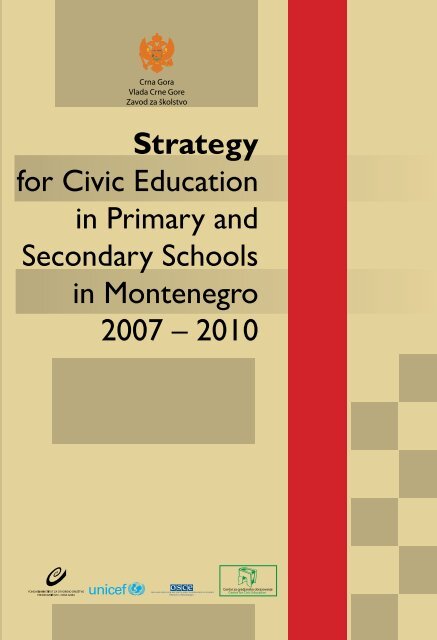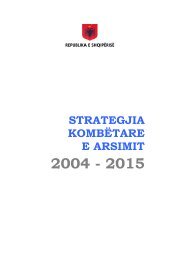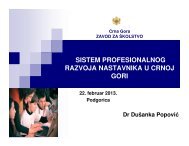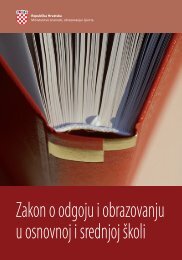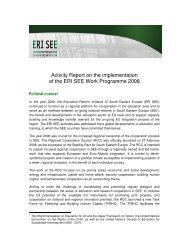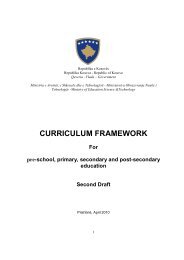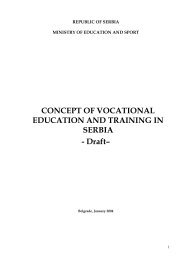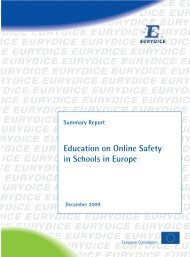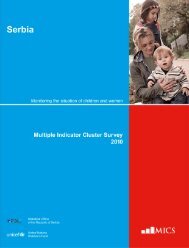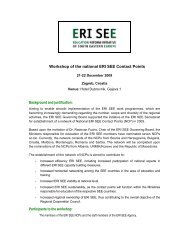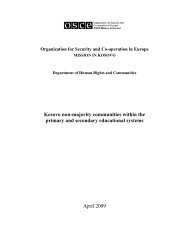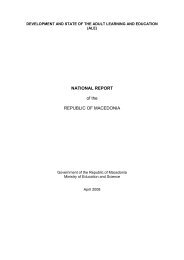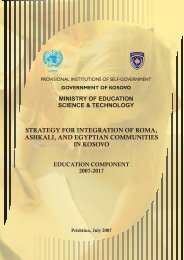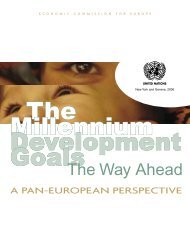Strategy for Civic Education in Primary and Secondary Schools in ...
Strategy for Civic Education in Primary and Secondary Schools in ...
Strategy for Civic Education in Primary and Secondary Schools in ...
Create successful ePaper yourself
Turn your PDF publications into a flip-book with our unique Google optimized e-Paper software.
Crna Gora<br />
Vlada Crne Gore<br />
Zavod za školstvo<br />
<strong>Strategy</strong><br />
<strong>for</strong> <strong>Civic</strong> <strong>Education</strong><br />
<strong>in</strong> <strong>Primary</strong> <strong>and</strong><br />
<strong>Secondary</strong> <strong>Schools</strong><br />
<strong>in</strong> Montenegro<br />
2007 – 2010
Crna Gora<br />
Vlada Crne Gore<br />
Zavod za školstvo<br />
STRATEGY<br />
<strong>for</strong> <strong>Civic</strong> <strong>Education</strong><br />
<strong>in</strong> <strong>Primary</strong> <strong>and</strong> <strong>Secondary</strong> <strong>Schools</strong><br />
<strong>in</strong> Montenegro<br />
2007 – 2010<br />
FOUNDATION OPEN SOCIETY INSTITUTE<br />
REPRESENTATIVE OFFICE – MONTENEGRO<br />
Podgorica, December 2007
Bureau <strong>for</strong> <strong>Education</strong>al Services<br />
<strong>Strategy</strong> <strong>for</strong> <strong>Civic</strong> <strong>Education</strong> <strong>in</strong> <strong>Primary</strong> <strong>and</strong> <strong>Secondary</strong> <strong>Schools</strong> <strong>in</strong><br />
Montenegro 2007 – 2010<br />
Publisher: Bureau <strong>for</strong> <strong>Education</strong>al Services<br />
<strong>in</strong> cooperation with<br />
Centre fro <strong>Civic</strong> <strong>Education</strong><br />
Editor: Dr Dragan Bogojević<br />
Authors: Zorica Kotri, Vidosava Kašćelan, Anđa Backović, Zoran Lalović<br />
Design <strong>and</strong> typeset: Studio MOUSE<br />
Proofread<strong>in</strong>g: Danijela Đilas<br />
Translation: Tamara Jurl<strong>in</strong>a<br />
Pr<strong>in</strong>t: Studio MOUSE, Podgorica<br />
Copies pr<strong>in</strong>ted: 400<br />
Podgorica, 2007<br />
Publication is available <strong>in</strong> electronic <strong>for</strong>m at:<br />
www.zavsko.org, www.mp<strong>in</strong>.cg.yu, www.osim.cg.yu, www.cgo.cg.yu
This document was developed by the Task Force <strong>for</strong> <strong>Civic</strong> <strong>Education</strong> of<br />
the Bureau <strong>for</strong> <strong>Education</strong>al Services <strong>in</strong> cooperation with our partners:<br />
Foundation Open Society Bureau – Representative Office Montenegro,<br />
OSCE Mission to Montenegro, UNICEF <strong>and</strong> the NGO Centre <strong>for</strong> <strong>Civic</strong><br />
<strong>Education</strong>.<br />
We owe special gratitude to Mr Tomislav Reskovac, education expert from<br />
Zagreb/Croatia, who acted as the consultant <strong>in</strong> the <strong>Strategy</strong> development<br />
process.
TABLE OF CONTENTS<br />
SUMMARY..........................................................................................9<br />
INTRODUCTION............................................................................13<br />
SITUATION ANALYSIS...................................................................15<br />
I<br />
II<br />
Status of <strong>Civic</strong> <strong>Education</strong> as a Subject.......................................15<br />
1. Pr<strong>in</strong>ciples of <strong>Education</strong> <strong>for</strong> Democratic Citizenship<br />
at School Level..............................................................................17<br />
2. <strong>Civic</strong> <strong>Education</strong> <strong>in</strong> <strong>Primary</strong> <strong>Education</strong>......................................18<br />
3. <strong>Civic</strong> <strong>Education</strong> <strong>in</strong> General <strong>Secondary</strong> <strong>Education</strong>...................18<br />
3.1 Status of <strong>Civic</strong> <strong>Education</strong> <strong>for</strong> Graduation<br />
Exam<strong>in</strong>ation <strong>in</strong> General <strong>Secondary</strong> <strong>Schools</strong>........................19<br />
4. Status of <strong>Education</strong> <strong>for</strong> Democratic Citizenship<br />
<strong>in</strong> Vocational <strong>Secondary</strong> <strong>Education</strong>...........................................20<br />
5. Teacher Certification <strong>and</strong> Status.................................................21<br />
6. Role of Local Community <strong>and</strong> General Public<br />
<strong>in</strong> Ensur<strong>in</strong>g the Subject Status....................................................21<br />
Teach<strong>in</strong>g, Curricula <strong>and</strong> Methodologies....................................22<br />
1. L<strong>in</strong>k<strong>in</strong>g <strong>Civic</strong> <strong>Education</strong> with Other Subjects..........................22<br />
2. <strong>Civic</strong> <strong>Education</strong> as an Elective Subject<br />
<strong>in</strong> General <strong>Secondary</strong> <strong>Schools</strong>....................................................24<br />
3. Teach<strong>in</strong>g Materials <strong>and</strong> Expert Literature.................................24<br />
III Teacher Tra<strong>in</strong><strong>in</strong>g.........................................................................25<br />
1. <strong>Primary</strong> School Teacher Tra<strong>in</strong><strong>in</strong>g...............................................26<br />
2. General <strong>Secondary</strong> School Teacher Tra<strong>in</strong><strong>in</strong>g............................27<br />
3. Undergraduate Teacher <strong>Education</strong>.............................................27<br />
IV Quality Monitor<strong>in</strong>g, Assurance <strong>and</strong> Improvement...................28<br />
1. Assess<strong>in</strong>g Quality of <strong>Civic</strong> <strong>Education</strong>........................................29<br />
2. Assess<strong>in</strong>g the Presence of <strong>Education</strong><br />
<strong>for</strong> Democratic Citizenship Pr<strong>in</strong>ciples <strong>in</strong> <strong>Schools</strong>...................30<br />
3. System of Quality Assurance <strong>and</strong> Improvement.........................30
V<br />
Additional Resources.................................................................31<br />
1. Nongovernmental Organisations Programmes...........................31<br />
2. Role of the University......................................................................32<br />
3. Association of <strong>Civic</strong> <strong>Education</strong> Teachers.....................................33<br />
4. In<strong>for</strong>mation on Additional Resources..........................................33<br />
STRATEGY ACTIVITIES.................................................................35<br />
I<br />
II<br />
Status of CE <strong>and</strong> <strong>Education</strong> <strong>for</strong> Democratic Citizenship..........35<br />
1. <strong>Education</strong> <strong>for</strong> Democratic Citizenship Pr<strong>in</strong>ciples<br />
at School Level..............................................................................36<br />
2. <strong>Civic</strong> <strong>Education</strong> <strong>in</strong> <strong>Primary</strong> <strong>Schools</strong>..........................................37<br />
3. <strong>Civic</strong> <strong>Education</strong> <strong>in</strong> General <strong>Secondary</strong> School.........................37<br />
4. EDC <strong>in</strong> <strong>Secondary</strong> Vocational <strong>Education</strong>.................................38<br />
5. Teacher Certification <strong>and</strong> Status.................................................29<br />
6. Role of Local Community <strong>and</strong> General Public<br />
<strong>in</strong> Ensur<strong>in</strong>g the Subject Status....................................................40<br />
Teach<strong>in</strong>g <strong>Civic</strong> <strong>Education</strong> <strong>and</strong> <strong>Education</strong> <strong>for</strong><br />
Democratic Citizenship..............................................................40<br />
1. Contents <strong>and</strong> Pr<strong>in</strong>ciples of <strong>Education</strong> <strong>for</strong><br />
Democratic Citizenship <strong>in</strong> Other Subjects................................40<br />
2. Elective Subjects with <strong>Education</strong> <strong>for</strong><br />
Democratic Citizenship Contents..............................................41<br />
3. Teach<strong>in</strong>g Materials <strong>and</strong> Expert Literature.................................42<br />
III <strong>Civic</strong> <strong>Education</strong> Teachers Tra<strong>in</strong><strong>in</strong>g.............................................43<br />
1. Tra<strong>in</strong><strong>in</strong>g of <strong>Primary</strong> School Teachers.........................................43<br />
2. Tra<strong>in</strong><strong>in</strong>g of General <strong>Secondary</strong> School Teachers......................44<br />
3. Undergraduate <strong>Education</strong> of Future Teachers..........................44<br />
IV Quality Monitor<strong>in</strong>g, Assurance <strong>and</strong> Improvement....................45<br />
1. Development of Indicators..........................................................45<br />
2. Assess<strong>in</strong>g Quality of <strong>Civic</strong> <strong>Education</strong> Teach<strong>in</strong>g.......................46<br />
3. Assess the Presence of <strong>Education</strong> <strong>for</strong><br />
Democratic Citizenship Pr<strong>in</strong>ciples <strong>in</strong> <strong>Schools</strong>..........................46<br />
4. Quality Assurance <strong>and</strong> Improvement System...........................47
V<br />
Use of Additional Resources......................................................48<br />
1. Cooperation with Nongovernmental Organisations..................48<br />
2. Association of <strong>Civic</strong> <strong>Education</strong> Teachers..................................49<br />
PRIORITIES AND TIMEFRAME....................................................51
SUMMARY<br />
The Bureau <strong>for</strong> <strong>Education</strong>al Services (BES) is an expert <strong>in</strong>stitution with<strong>in</strong><br />
the education system of Montenegro deal<strong>in</strong>g with pre-school, primary<br />
<strong>and</strong> general secondary school education. The ma<strong>in</strong> fields of activities<br />
<strong>for</strong> the Bureau <strong>in</strong>clude curriculum design <strong>and</strong> monitor<strong>in</strong>g, professional<br />
development of teachers, assessment of education quality <strong>and</strong> exam<strong>in</strong>ation<br />
of teach<strong>in</strong>g practices.<br />
Dur<strong>in</strong>g the four years of its operation, the Bureau <strong>for</strong> <strong>Education</strong>al Services<br />
launched a number of activities related to the <strong>in</strong>troduction of the new<br />
subject, <strong>Civic</strong> <strong>Education</strong>, <strong>in</strong> primary <strong>and</strong> general secondary schools. The<br />
curricula were designed, tra<strong>in</strong><strong>in</strong>g of teachers commenced, the Task Force<br />
<strong>for</strong> <strong>Civic</strong> <strong>Education</strong> was established with<strong>in</strong> the BES, the cooperation with<br />
<strong>in</strong>terested partners is <strong>in</strong> place, the establishment of the Association of<br />
<strong>Civic</strong> <strong>Education</strong> Teachers was supported, <strong>and</strong> f<strong>in</strong>ally, this <strong>Strategy</strong> was<br />
prepared.<br />
Why do we need the <strong>Strategy</strong><br />
Notwithst<strong>and</strong><strong>in</strong>g the good foundations set by the basic re<strong>for</strong>m documents<br />
<strong>and</strong> great enthusiasm over the novelties be<strong>in</strong>g <strong>in</strong>troduced <strong>in</strong>to<br />
our education system approximat<strong>in</strong>g European st<strong>and</strong>ards <strong>in</strong> education,<br />
it is quite apparent that we lack a comprehensive, strategic approach <strong>in</strong><br />
ma<strong>in</strong>ta<strong>in</strong><strong>in</strong>g the <strong>Civic</strong> <strong>Education</strong> quality. The very nature of the subject<br />
is closely l<strong>in</strong>ked to ongo<strong>in</strong>g changes <strong>and</strong> challenges with<strong>in</strong> the society it<br />
s supposed to provide mean<strong>in</strong>gful response to. Or, to put it differently,<br />
the subject needs to rema<strong>in</strong> open towards societal changes <strong>and</strong> “elastic”<br />
enough to be able to atta<strong>in</strong> own goals.
On the other h<strong>and</strong>, it is not realistic to expect that complex goals of these<br />
curricula may be achieved without the <strong>in</strong>volvement <strong>and</strong> the support not<br />
only of school, but also parents, local community, the M<strong>in</strong>istry of <strong>Education</strong><br />
<strong>and</strong> Science, the University, nongovernmental sector, other partners, the<br />
public, etc. In order <strong>for</strong> the support to be well-planned <strong>and</strong> coord<strong>in</strong>ated,<br />
as well as last<strong>in</strong>g, a “tool” or a “guide” needs to be developed to direct the<br />
process – concern<strong>in</strong>g the types of support, who is to provide support, the<br />
responsibilities, deadl<strong>in</strong>es, needs, how to recognize effective support, etc.<br />
Led by such notions, we focused the <strong>Strategy</strong> on five key areas to provide<br />
a comprehensive <strong>and</strong> well-planned approach <strong>in</strong> address<strong>in</strong>g the challenges<br />
ahead.<br />
I Status of <strong>Civic</strong> <strong>Education</strong> <strong>and</strong> <strong>Education</strong> <strong>for</strong> Democratic Citizenship.<br />
Here we def<strong>in</strong>e the activities to provide <strong>for</strong> better curricula viability <strong>and</strong><br />
improve their quality:<br />
• by apply<strong>in</strong>g democratic citizenship pr<strong>in</strong>ciples to the overall school<br />
life,<br />
• by <strong>in</strong>corporat<strong>in</strong>g democratic citizenship values <strong>in</strong> teach<strong>in</strong>g other<br />
subjects,<br />
• by extend<strong>in</strong>g the offer of elective subjects with education <strong>for</strong><br />
democratic citizenship contents <strong>and</strong> by def<strong>in</strong><strong>in</strong>g the role of <strong>Civic</strong><br />
<strong>Education</strong> as a supplement to matura st<strong>and</strong>ards,<br />
• by <strong>in</strong>troduc<strong>in</strong>g <strong>Civic</strong> <strong>Education</strong> as an elective subject <strong>in</strong> secondary<br />
vocational schools <strong>and</strong> by extend<strong>in</strong>g the exist<strong>in</strong>g Sociology curriculum<br />
<strong>in</strong> these schools with democratic citizenship goals <strong>and</strong> contents,<br />
• by def<strong>in</strong><strong>in</strong>g teacher competencies (knowledge, skills <strong>and</strong> attitudes)<br />
<strong>and</strong> sett<strong>in</strong>g the certification procedure <strong>for</strong> acquired competencies,<br />
• by promot<strong>in</strong>g the values of democratic citizenship with<strong>in</strong> the local<br />
community, among the educational <strong>and</strong> general public.<br />
II Teach<strong>in</strong>g, Curricula <strong>and</strong> Methodologies. The <strong>Strategy</strong> goals <strong>in</strong> this<br />
area aim to achieve:<br />
• better l<strong>in</strong>k<strong>in</strong>g of democratic citizenship contents <strong>and</strong> pr<strong>in</strong>ciples<br />
with teach<strong>in</strong>g <strong>in</strong> other subject areas,<br />
• <strong>in</strong>troduction of new elective subjects treat<strong>in</strong>g the topics currently<br />
not <strong>in</strong>cluded <strong>in</strong> <strong>Civic</strong> <strong>Education</strong> teach<strong>in</strong>g (e.g. media literacy, law<br />
<strong>in</strong> daily life etc.),<br />
10
• ongo<strong>in</strong>g compilation <strong>and</strong> provision of teach<strong>in</strong>g materials <strong>and</strong><br />
expert literature which should enable the teachers permanent<br />
access to knowledge <strong>and</strong> modern teach<strong>in</strong>g methodologies <strong>in</strong> the<br />
field of civic education.<br />
III Teacher Tra<strong>in</strong><strong>in</strong>g. The activities to enhance tra<strong>in</strong><strong>in</strong>g have been def<strong>in</strong>ed<br />
to ensure:<br />
• the development of ongo<strong>in</strong>g <strong>and</strong> enhanced tra<strong>in</strong><strong>in</strong>g system (with<br />
new contents <strong>and</strong> goals), follow<strong>in</strong>g the basic tra<strong>in</strong><strong>in</strong>g <strong>for</strong> primary<br />
<strong>and</strong> general secondary school teachers,<br />
• the creation of the roster of tra<strong>in</strong>ers, consist<strong>in</strong>g of teachers who<br />
have acquired tra<strong>in</strong>er competencies, <strong>and</strong><br />
• the <strong>in</strong>clusion of democratic citizenship pr<strong>in</strong>ciples <strong>and</strong> practices<br />
<strong>in</strong> university curricula, the undergraduate teacher education<br />
programme.<br />
IV Quality Monitor<strong>in</strong>g, Assurance <strong>and</strong> Improvement. To constantly<br />
monitor, assure <strong>and</strong> improve the quality of <strong>Civic</strong> <strong>Education</strong> teach<strong>in</strong>g, <strong>and</strong><br />
the learn<strong>in</strong>g context, we have devised the follow<strong>in</strong>g activities:<br />
• teach<strong>in</strong>g quality <strong>and</strong> the presence of democratic citizenship<br />
pr<strong>in</strong>ciples <strong>in</strong> schools are monitored by clearly def<strong>in</strong>ed <strong>in</strong>dicators<br />
enabl<strong>in</strong>g measurement of quality <strong>and</strong> the level to which the<br />
pr<strong>in</strong>ciples are present,<br />
• based on the <strong>in</strong><strong>for</strong>mation obta<strong>in</strong>ed by assess<strong>in</strong>g <strong>in</strong>dicators, teach<strong>in</strong>g<br />
quality <strong>and</strong> presence of democratic citizenship pr<strong>in</strong>ciples are<br />
permanently enhanced,<br />
• development <strong>and</strong> application of the evaluation <strong>and</strong> self-evaluation<br />
models,<br />
• strengthen<strong>in</strong>g capacities of school <strong>and</strong> BES employees – tra<strong>in</strong><strong>in</strong>g<br />
<strong>for</strong> the application of evaluation models; develop a roster of<br />
tra<strong>in</strong>ers.<br />
V Use of Additional Resources. The so-called external sources or resources<br />
(nongovernmental organisations programmes, the University, Association<br />
of <strong>Civic</strong> <strong>Education</strong> Teachers) provide strong support to <strong>Civic</strong> <strong>Education</strong><br />
quality monitor<strong>in</strong>g <strong>and</strong> assurance. In order <strong>for</strong> the support to be constant<br />
<strong>and</strong> well-planned, the <strong>Strategy</strong> envisages the follow<strong>in</strong>g activities:<br />
11
12<br />
• def<strong>in</strong>ition of clear criteria <strong>for</strong> the selection of programmes offered<br />
to schools by nongovernmental organisations,<br />
• regular <strong>in</strong><strong>for</strong>mation provided to teachers concern<strong>in</strong>g the programmes<br />
available <strong>and</strong> other sources of support, outside school,<br />
• strengthen<strong>in</strong>g cooperation with local, regional <strong>and</strong> <strong>in</strong>ternational<br />
programmes <strong>and</strong> organizations <strong>in</strong> carry<strong>in</strong>g out the activities<br />
envisaged by the <strong>Strategy</strong>,<br />
• strengthen<strong>in</strong>g the role <strong>and</strong> capacities of the Association of <strong>Civic</strong><br />
<strong>Education</strong> Teachers to take part <strong>in</strong> the <strong>Strategy</strong> implementation,<br />
together with BES.<br />
The Action Plan def<strong>in</strong><strong>in</strong>g <strong>in</strong> detail the contents of the activities, the timeframe,<br />
<strong>in</strong>dicators <strong>and</strong> responsibilities of all the actors makes an <strong>in</strong>tegral<br />
part of the <strong>Strategy</strong>.<br />
The <strong>Strategy</strong> value is seen <strong>in</strong> the fact that it l<strong>in</strong>ks the Bureau <strong>for</strong> <strong>Education</strong><br />
Services with a wide network of participants <strong>in</strong> the <strong>Strategy</strong> implementation<br />
<strong>and</strong> its future users: education <strong>in</strong>stitutions at various levels, education<br />
policy-makers, nongovernmental sector (domestic <strong>and</strong> <strong>in</strong>ternational),<br />
local community <strong>and</strong> the general public.<br />
The <strong>Strategy</strong> implementation will give a strong impetus to enhanc<strong>in</strong>g<br />
capacities of the BES <strong>and</strong> the Task Force <strong>for</strong> <strong>Civic</strong> <strong>Education</strong>, <strong>in</strong> particular<br />
regard<strong>in</strong>g monitor<strong>in</strong>g <strong>and</strong> evaluation as key areas of action. <strong>Education</strong><br />
quality measurement then becomes the universal “language” ensur<strong>in</strong>g<br />
cooperation, shar<strong>in</strong>g of experiences, ongo<strong>in</strong>g organisational learn<strong>in</strong>g<br />
<strong>and</strong> a permanent challenge to improve quality.<br />
This is a pioneer venture <strong>for</strong> Montenegr<strong>in</strong> education <strong>in</strong> which the very<br />
presentation of the <strong>Strategy</strong> is of great importance; a conference will<br />
also be organised not only to promote the <strong>Strategy</strong> but also to identify<br />
sources of expert support <strong>and</strong> other <strong>for</strong>ms of support <strong>for</strong> its successful<br />
implementation.<br />
We believe the <strong>Strategy</strong> opens the door to the process provid<strong>in</strong>g each new<br />
generation enter<strong>in</strong>g Montenegr<strong>in</strong> education system with an opportunity<br />
to learn the “lessons” of democratic citizenship, but also to practice democratic<br />
pr<strong>in</strong>ciples <strong>and</strong> values <strong>in</strong> an enabl<strong>in</strong>g environment.
INTRODUCTION<br />
The education re<strong>for</strong>m <strong>in</strong> Montenegro, or the actual <strong>in</strong>troduction of new<br />
curricula <strong>in</strong> primary schools started <strong>in</strong> the school year 2004/05. It was<br />
preceded by an <strong>in</strong>tensive process of new curricula development. Hav<strong>in</strong>g<br />
commenced with the changes <strong>in</strong> the education system <strong>and</strong> work<strong>in</strong>g<br />
towards its harmonisation with the st<strong>and</strong>ards of developed European<br />
countries, while preserv<strong>in</strong>g our traditional values <strong>and</strong> best achievements<br />
<strong>in</strong> education, we have noted the significance of civic education <strong>and</strong> the<br />
need to promote the pr<strong>in</strong>ciples underly<strong>in</strong>g fundamental civic <strong>and</strong> humane<br />
values across the whole education system.<br />
The Book of Changes (2001), which sets the general aims of changes <strong>in</strong><br />
education, states the social goals that should contribute to a responsible<br />
behaviour of <strong>in</strong>dividuals <strong>and</strong> groups towards the pr<strong>in</strong>ciples <strong>and</strong> norms<br />
of a civil <strong>and</strong> democratic society, <strong>and</strong> to the promotion of livelong learn<strong>in</strong>g<br />
approach.<br />
The given pr<strong>in</strong>ciples <strong>and</strong> goals are embedded <strong>in</strong> our tradition <strong>and</strong> the<br />
Constitution, but also <strong>in</strong> <strong>in</strong>ternational documents. The Council of Europe’s<br />
<strong>in</strong>itiatives <strong>and</strong> declarations were also the start<strong>in</strong>g po<strong>in</strong>ts <strong>for</strong> the<br />
<strong>in</strong>troduction of civic education <strong>in</strong>to our education system. <br />
While develop<strong>in</strong>g the <strong>Civic</strong> <strong>Education</strong> curriculum <strong>for</strong> primary <strong>and</strong> second-<br />
General Declaration on Human Rights, Declaration on the Rights of Child, Convention<br />
on the Rights of Child, Convention aga<strong>in</strong>st Discrim<strong>in</strong>ation <strong>in</strong> <strong>Education</strong>, etc.<br />
Initiative <strong>for</strong> the Introduction of <strong>Education</strong> <strong>for</strong> Democratic Citizenship of Heads of<br />
States <strong>and</strong> Governments of EU Member States, Strasbourg, 1997, Declaration <strong>and</strong><br />
the Programme of <strong>Education</strong> <strong>for</strong> Democratic Citizenship Based on Rights <strong>and</strong> Responsibilities,<br />
Council of M<strong>in</strong>isters, Budapest, 1999, “<strong>Education</strong> <strong>and</strong> Tra<strong>in</strong><strong>in</strong>g <strong>in</strong> Europe“,<br />
2002, Def<strong>in</strong>ition <strong>and</strong> Selection of Key Competencies, OECD, 2005.<br />
13
ary schools, we also took on board the experiences of the countries <strong>in</strong> the<br />
region. Own experience ga<strong>in</strong>ed through the implementation of various<br />
civic education projects <strong>and</strong> programmes implemented <strong>in</strong> our schools<br />
gave a special impetus. Cooperation with the representatives of educational<br />
<strong>in</strong>stitutions, with nongovernmental organisations <strong>in</strong> Montenegro<br />
<strong>and</strong> the countries <strong>in</strong> the region, participation to regional conferences<br />
organised by the Council of Europe, one of which was held at Cet<strong>in</strong>je <strong>in</strong><br />
2005, set the foundation both <strong>for</strong> this document development <strong>and</strong> <strong>for</strong><br />
build<strong>in</strong>g better partnerships with South-eastern European countries <strong>and</strong><br />
countries of the wider region.<br />
This all set the grounds <strong>for</strong> the <strong>in</strong>troduction <strong>and</strong> promotion of civic<br />
education values, both as a separate subject <strong>and</strong> as a pr<strong>in</strong>ciple <strong>in</strong> the<br />
education process as such.<br />
<strong>Education</strong> <strong>for</strong> democratic citizenship is a process tak<strong>in</strong>g place <strong>in</strong> many<br />
countries <strong>in</strong> Europe, but also outside Europe. Apart from be<strong>in</strong>g an <strong>in</strong>dicator<br />
of education quality <strong>in</strong> a country, it is <strong>in</strong>creas<strong>in</strong>gly more recognised as a<br />
strong foothold <strong>for</strong> societal development <strong>and</strong> European Union accession.<br />
It is all the reason more to network, share knowledge <strong>and</strong> experiences <strong>in</strong><br />
the field with other countries. The <strong>Strategy</strong> encourages such communication<br />
<strong>and</strong> provides <strong>for</strong> its susta<strong>in</strong>ability.<br />
14
SITUATION ANALYSIS<br />
I Status of <strong>Civic</strong> <strong>Education</strong> as a Subject<br />
Accord<strong>in</strong>g to the Council of Europe’s def<strong>in</strong>ition , <strong>Education</strong> <strong>for</strong> Democratic<br />
Citizenship (EDC) is “a set of practices <strong>and</strong> pr<strong>in</strong>ciples aimed at<br />
mak<strong>in</strong>g young people <strong>and</strong> adults better equipped to participate actively<br />
<strong>in</strong> democratic life by assum<strong>in</strong>g <strong>and</strong> exercis<strong>in</strong>g their rights <strong>and</strong> responsibilities<br />
<strong>in</strong> society.“ Follow<strong>in</strong>g the M<strong>in</strong>isterial conference , EDC has<br />
become the common goal <strong>in</strong> education <strong>and</strong> the basic trend <strong>in</strong> European<br />
education policies.<br />
EDC covers a wide range of activities <strong>and</strong> programmes grouped <strong>in</strong> four<br />
ma<strong>in</strong> areas: human rights education, political education, education <strong>for</strong><br />
peace <strong>and</strong> education <strong>for</strong> democracy, <strong>and</strong> it takes place <strong>in</strong> different <strong>for</strong>ms<br />
of education – <strong>for</strong>mal, non-<strong>for</strong>mal <strong>and</strong> <strong>in</strong><strong>for</strong>mal. EDC policy is based on<br />
the pr<strong>in</strong>ciples of life-long learn<strong>in</strong>g.<br />
When so <strong>for</strong>mulated, it becomes clear EDC presents a comprehensive<br />
<strong>and</strong> far-reach<strong>in</strong>g vision, an ideal we need to aspire to <strong>in</strong> design<strong>in</strong>g educational<br />
policies, at different levels <strong>and</strong> <strong>in</strong> different learn<strong>in</strong>g environments.<br />
However, at the current po<strong>in</strong>t <strong>in</strong> the process, most often recognised are<br />
the elements carried out <strong>in</strong> <strong>for</strong>mal education, be it as separate subjects<br />
(compulsory <strong>and</strong> elective), as an <strong>in</strong>tegrative approach to teach<strong>in</strong>g or as<br />
extracurricular activities.<br />
Birzea, C. Et al: All-European Study on Policies <strong>for</strong> <strong>Education</strong> <strong>for</strong> Democratic Citizenship,<br />
Centre <strong>for</strong> <strong>Civic</strong> <strong>Education</strong>, 2005, Podgorica<br />
Krakov, 2000<br />
15
To that effect, <strong>Civic</strong> <strong>Education</strong> (CE) is a separate subject <strong>in</strong> <strong>for</strong>mal education<br />
– <strong>in</strong> primary <strong>and</strong> general secondary education; <strong>in</strong> primary school<br />
be<strong>in</strong>g an obligatory subject, <strong>and</strong> <strong>in</strong> general secondary schools the so-called<br />
obligatory elective subject.<br />
We deem particularly important to underl<strong>in</strong>e the extension of the objectives<br />
of these subjects: from knowledge about democracy <strong>and</strong> human<br />
rights towards the education <strong>for</strong> civil competencies, i.e. to develop skills<br />
<strong>and</strong> values which should act as a bridge from knowledge to behaviour.<br />
Summ<strong>in</strong>g up the discussion on the goals of education <strong>for</strong> democratic<br />
citizenship <strong>in</strong> school, we wish to give emphasis to the follow<strong>in</strong>g aspects.<br />
In order to develop read<strong>in</strong>ess of <strong>in</strong>dividuals to play a more active role <strong>in</strong><br />
the society, <strong>in</strong> school students should:<br />
• acquire knowledge <strong>and</strong> <strong>in</strong><strong>for</strong>mation about their rights, responsibilities,<br />
opportunities <strong>and</strong> ways <strong>for</strong> action with<strong>in</strong> a community;<br />
• develop abilities <strong>for</strong> observ<strong>in</strong>g social problems <strong>and</strong> their resolution<br />
through cooperation;<br />
• develop motivation to use newly acquired knowledge <strong>and</strong> skills,<br />
apart from school, also <strong>in</strong> their life.<br />
This general objective is further specified through each of the three components<br />
of civic action (specific knowledge, skills <strong>and</strong> values).<br />
<strong>Civic</strong> <strong>Education</strong> as a subject is somewhat specific. In primary education,<br />
more emphasis is placed on process goals (develop civic action skills <strong>and</strong><br />
values among pupils), while <strong>in</strong> secondary education equal emphasis is<br />
placed on all three components of the general goal (develop knowledge,<br />
skills <strong>and</strong> values among general secondary school students).<br />
After the experience with <strong>in</strong>troduc<strong>in</strong>g CE, it became apparent that the<br />
subject status <strong>and</strong> the atta<strong>in</strong>ability of its goals are closely l<strong>in</strong>ked with the<br />
follow<strong>in</strong>g factors: exist<strong>in</strong>g level of democratic environment <strong>and</strong> practices<br />
<strong>in</strong> school, recognition of the subject significance <strong>for</strong> atta<strong>in</strong>ment of school<br />
goals by the school management <strong>and</strong> other teachers, degree to which CE<br />
elements are <strong>in</strong>cluded <strong>in</strong> other curricula, level of competence of teachers<br />
of other subject matters to recognise CE goals <strong>and</strong> their read<strong>in</strong>ess to<br />
promote these ideas <strong>and</strong> practices <strong>in</strong> their teach<strong>in</strong>g.<br />
16
It is clear that only a long-term, systemic approach strik<strong>in</strong>g a good balance<br />
between CE as a separate subject <strong>and</strong> simultaneous action of all pr<strong>in</strong>ciples<br />
of civic education at different levels of school life enables susta<strong>in</strong>ability of<br />
goals, quality of knowledge <strong>and</strong> actual impact towards desired changes<br />
<strong>in</strong> education <strong>and</strong> <strong>in</strong> the society.<br />
The EDC concept exceeds the framework of the subject itself. EDC also<br />
implies the exercise of the subject goals through the contents <strong>and</strong> activities<br />
of all subjects at school throughout the primary, secondary <strong>and</strong> higher<br />
education <strong>and</strong> onwards. In addition, school is but one place to learn <strong>and</strong><br />
practice EDC; it needs to be learnt <strong>in</strong> life <strong>and</strong> to last throughout life.<br />
Understood as such, apart from the exist<strong>in</strong>g subjects, EDC implies the<br />
achievement of civic education goals:<br />
• through all school subjects (cross-curricular),<br />
• through extra-curricular <strong>and</strong> free activities pupils per<strong>for</strong>m <strong>in</strong>side<br />
<strong>and</strong> outside school,<br />
• by cherish<strong>in</strong>g <strong>and</strong> practic<strong>in</strong>g democratic values <strong>in</strong> learn<strong>in</strong>g <strong>and</strong><br />
liv<strong>in</strong>g at school,<br />
• by pupils tak<strong>in</strong>g an active part <strong>in</strong> school bodies <strong>and</strong> other bodies<br />
outside school.<br />
1. Pr<strong>in</strong>ciples of <strong>Education</strong> <strong>for</strong> Democratic<br />
Citizenship at School Level<br />
The <strong>in</strong>creas<strong>in</strong>g awareness concern<strong>in</strong>g the importance of civic education<br />
towards the atta<strong>in</strong>ment of desired changes <strong>in</strong> education was already visible<br />
<strong>in</strong> basic documents of the education re<strong>for</strong>m which clearly identified<br />
the pr<strong>in</strong>ciples <strong>and</strong> values promot<strong>in</strong>g <strong>and</strong> strengthen<strong>in</strong>g civil society <strong>in</strong><br />
Montenegro. The new curricula are pervaded with such goals.<br />
One of the fundamental EDC pr<strong>in</strong>ciples is to enable, through vertical<br />
coherence of CE curricula, cont<strong>in</strong>uous build<strong>in</strong>g of knowledge <strong>and</strong> civic<br />
competences of children <strong>and</strong> the young at school that may be achieved by<br />
creat<strong>in</strong>g an environment <strong>in</strong> which the pr<strong>in</strong>ciples of democratic citizenship<br />
become part of daily life <strong>and</strong> school practice.<br />
17
2. <strong>Civic</strong> <strong>Education</strong> <strong>in</strong> <strong>Primary</strong> <strong>Education</strong><br />
<strong>Civic</strong> <strong>Education</strong> <strong>for</strong> 6 th <strong>and</strong> 7 th grade was <strong>in</strong>troduced as a new, compulsory<br />
subject, with 35 classes a year. Its evolv<strong>in</strong>g nature is enabled through the<br />
goals <strong>and</strong> contents of this subject build<strong>in</strong>g on the knowledge <strong>and</strong> competencies<br />
acquired through the subjects Nature <strong>and</strong> Society (1 st , 2 nd <strong>and</strong><br />
3 rd grade), Nature <strong>and</strong> Technology (4 th grade), Society (4 th <strong>and</strong> 5 th grade),<br />
some of which are taught start<strong>in</strong>g from grade 1 of primary school.<br />
Already while design<strong>in</strong>g the CE curriculum, it was obvious that the<br />
quality of teach<strong>in</strong>g <strong>and</strong> the subject status would greatly depend on the<br />
overall school environment: level of democracy of education relations <strong>and</strong><br />
autonomy of the school <strong>and</strong> teachers, the position of pupils <strong>in</strong> teach<strong>in</strong>g,<br />
teacher competencies, the relation of all participants <strong>in</strong> the education<br />
process towards the subject.<br />
For the time be<strong>in</strong>g we may not say that the pr<strong>in</strong>ciple of evolution <strong>and</strong> cont<strong>in</strong>uous<br />
build<strong>in</strong>g on the knowledge <strong>and</strong> civic competencies of children <strong>and</strong><br />
the young at school has been fully ensured. We still lack the curricula <strong>and</strong><br />
the opportunity to study CE <strong>in</strong> 8 th <strong>and</strong> 9 th grade, which may be enabled by<br />
provid<strong>in</strong>g elective subjects. Thus, as of this year a new elective subject has<br />
been <strong>in</strong>troduced called Study of Humanitarian Law as an elective <strong>in</strong> 8 th <strong>and</strong><br />
9 th grade. For several years <strong>in</strong> a row now a project entitled “We the people…I<br />
a citizen” is be<strong>in</strong>g implemented with<strong>in</strong> extracurricular activities.<br />
3. <strong>Civic</strong> <strong>Education</strong> <strong>in</strong><br />
General <strong>Secondary</strong> <strong>Education</strong><br />
The very <strong>in</strong>troduction of this subject was preceded by several decade long<br />
practice of teach<strong>in</strong>g the subject entitled Constitution <strong>and</strong> Citizens’ Rights,<br />
focus<strong>in</strong>g on political education <strong>and</strong> the so-called political literacy.<br />
The new curriculum <strong>for</strong> general secondary school does not envisage any<br />
specialisation, but it enables the students, by selection of appropriate<br />
electives, to create <strong>in</strong>dependently part of their education package. Each<br />
school is obliged to offer from the list of compulsory electives, <strong>in</strong> accord-<br />
18
ance with own human <strong>and</strong> spatial resources, start<strong>in</strong>g from the 1 st grade<br />
at least five obligatory elective subjects. In the follow<strong>in</strong>g grades, the list<br />
of elective subjects offered with<strong>in</strong> the school will be made <strong>in</strong> accordance<br />
with the expressed <strong>in</strong>tentions <strong>and</strong> wishes of students dur<strong>in</strong>g the previous<br />
grade. Each school year students decide on obligatory elective subject<br />
– any student can enter <strong>Civic</strong> <strong>Education</strong> curriculum at any grade.<br />
<strong>Civic</strong> <strong>Education</strong> <strong>in</strong> general secondary schools is an obligatory elective<br />
subject which may be chosen all the way from the 1 st to the 4 th grade,<br />
with the total of 35 classes a year <strong>in</strong> the 1 st <strong>and</strong> 2 nd grade, <strong>and</strong> 70 classes<br />
a year <strong>in</strong> the 3 rd grade <strong>and</strong> 64 classes a year <strong>in</strong> the 4 th grade. Dur<strong>in</strong>g the<br />
school year 2006/07, some 1,000 students from 19 out of the total of 23<br />
general secondary schools chose CE courses.<br />
The developmental nature of CE is provided with the goals <strong>and</strong> contents<br />
of this subject build<strong>in</strong>g on the knowledge <strong>and</strong> competencies acquired <strong>in</strong><br />
primary school with<strong>in</strong> <strong>Civic</strong> <strong>Education</strong>, but also some other subjects.<br />
The curriculum <strong>for</strong> general secondary school envisages 2 classes a week<br />
<strong>for</strong> obligatory electives, or the total of 72 classes <strong>for</strong> each of the first three<br />
grades <strong>and</strong> 32 classes <strong>in</strong> the 4 th grade. This “space” enables, <strong>in</strong> addition<br />
to the exist<strong>in</strong>g curriculum, <strong>for</strong> other contents of civic education to be<br />
<strong>in</strong>corporated <strong>in</strong> all years of secondary education.<br />
3.1 Status of <strong>Civic</strong> <strong>Education</strong> <strong>for</strong> Graduation<br />
Exam<strong>in</strong>ation <strong>in</strong> General <strong>Secondary</strong> <strong>Schools</strong><br />
In the school year 2009/10, the students who enrolled general secondary<br />
schools <strong>in</strong> the school year 2006/07 will be tak<strong>in</strong>g their graduation exam<strong>in</strong>ation<br />
(matura exam) accord<strong>in</strong>g to the new Law on General <strong>Secondary</strong><br />
<strong>Schools</strong>. It implies tak<strong>in</strong>g exam<strong>in</strong>ations <strong>in</strong> compulsory <strong>and</strong> elective<br />
subjects, accord<strong>in</strong>g to the def<strong>in</strong>ed matura st<strong>and</strong>ards with<strong>in</strong> the Plan <strong>for</strong><br />
General <strong>Secondary</strong> <strong>Schools</strong>.<br />
Its elective status makes CE not eligible as a separate subject <strong>for</strong> matura<br />
exam<strong>in</strong>ation, but may serve to the students who choose it as supplement<br />
of the matura st<strong>and</strong>ard <strong>for</strong> similar subjects.<br />
19
At this po<strong>in</strong>t, the evaluation of this subject is still not clearly def<strong>in</strong>ed<br />
when enroll<strong>in</strong>g relevant faculties; this process is currently <strong>in</strong> progress.<br />
It is to be preceded by the def<strong>in</strong>ition of the exam catalogue <strong>for</strong> obligatory<br />
subjects from the Teach<strong>in</strong>g Plan. The same process will be used to<br />
def<strong>in</strong>e the supplement of matura st<strong>and</strong>ard <strong>for</strong> social sciences which will<br />
give the answer to the question to what extent the CE supplements these<br />
st<strong>and</strong>ards. Know<strong>in</strong>g the curricula <strong>for</strong> social sciences, the role of CE <strong>in</strong><br />
3 rd <strong>and</strong> 4 th grade will be quite substantial as matura st<strong>and</strong>ard supplement.<br />
However, we need to def<strong>in</strong>e <strong>in</strong> what manner <strong>and</strong> <strong>for</strong> which subjects the<br />
CE may serve to supplement the envisaged matura st<strong>and</strong>ard.<br />
4. Status of <strong>Education</strong> <strong>for</strong> Democratic<br />
Citizenship <strong>in</strong> Vocational <strong>Secondary</strong><br />
<strong>Education</strong><br />
The vocational secondary education re<strong>for</strong>m stemmed from the need<br />
<strong>for</strong> students to be well qualified to work <strong>in</strong> their l<strong>in</strong>e of work, <strong>for</strong> their<br />
education to be better adapted to labour market needs, <strong>and</strong> to be able to<br />
cont<strong>in</strong>ue their education at similar faculties.<br />
The application of new curricula <strong>in</strong> some of these schools, i.e. <strong>for</strong> some<br />
professions, started <strong>in</strong> the school year 2004/05. <strong>Civic</strong> <strong>Education</strong> does not<br />
feature as a separate subject. The contents of the subject entitled Sociology<br />
(both <strong>in</strong> three- <strong>and</strong> four-year schools) may be upgraded <strong>and</strong> extended<br />
with EDC contents, <strong>and</strong> another alternative is to <strong>in</strong>troduce EDC-based<br />
electives.<br />
Hav<strong>in</strong>g <strong>in</strong> m<strong>in</strong>d the grow<strong>in</strong>g numbers of students enroll<strong>in</strong>g secondary<br />
vocational schools (currently some 70% of all pupils who complete primary<br />
schools), there is an obvious need to <strong>in</strong>troduce the EDC contents<br />
<strong>in</strong> these schools as well. Otherwise, it would happen that two thirds of<br />
all secondary school students <strong>in</strong> Montenegro would not have access to<br />
these contents <strong>and</strong> opportunities.<br />
20
5. Teacher Certification <strong>and</strong> Status<br />
The teachers currently <strong>in</strong>volved <strong>in</strong> teach<strong>in</strong>g CE are be<strong>in</strong>g tra<strong>in</strong>ed <strong>for</strong> the<br />
implementation of new curricula. Dur<strong>in</strong>g their <strong>in</strong>itial undergraduate<br />
teacher education they had no opportunity to ga<strong>in</strong> knowledge <strong>and</strong> skills<br />
<strong>for</strong> atta<strong>in</strong><strong>in</strong>g the goals of such curricula.<br />
In other words, the given tra<strong>in</strong><strong>in</strong>g <strong>in</strong>volves the acquisition of additional<br />
qualifications <strong>for</strong> teachers already <strong>in</strong>volved or to be <strong>in</strong>volved <strong>in</strong> teach<strong>in</strong>g<br />
these contents. The problem we have been fac<strong>in</strong>g from the very start of<br />
tra<strong>in</strong><strong>in</strong>g is that we still lack systematic approach to the acquisition of<br />
further qualifications <strong>and</strong> the certification process has not been put <strong>in</strong><br />
place yet. The solution to this should be sought <strong>in</strong> the agreement with<br />
the University <strong>and</strong> the M<strong>in</strong>istry of <strong>Education</strong> <strong>and</strong> Science.<br />
6. Role of Local Community <strong>and</strong> General Public<br />
<strong>in</strong> Ensur<strong>in</strong>g the Subject Status<br />
The changes <strong>in</strong> education require local communities to get more actively<br />
<strong>in</strong>volved <strong>in</strong> the life <strong>and</strong> work of the school from their territory. To that<br />
effect, the process of develop<strong>in</strong>g new curricula opens the “space” <strong>for</strong> this<br />
changed role of the local community: all curricula are open to a certa<strong>in</strong><br />
degree giv<strong>in</strong>g room <strong>for</strong> the local community to step <strong>in</strong> their design, endeavour<strong>in</strong>g<br />
to express the specific features of each local community <strong>and</strong><br />
the need to cooperate <strong>and</strong> exercise mutual <strong>in</strong>fluences between the school<br />
<strong>and</strong> the local community.<br />
The progress we have made so far <strong>in</strong> this process is visible when it comes to<br />
elective topics <strong>for</strong> compulsory or elective subjects, as well as <strong>for</strong> extra-curricular<br />
activities <strong>and</strong> other tra<strong>in</strong><strong>in</strong>g programmes implemented, primarily,<br />
by nongovernmental organisations <strong>in</strong> cooperation with the Bureau <strong>for</strong><br />
<strong>Education</strong>al Services <strong>and</strong> the M<strong>in</strong>istry of <strong>Education</strong> <strong>and</strong> Science.<br />
Local communities are, at the same time, fac<strong>in</strong>g own challenges <strong>in</strong> ef<strong>for</strong>ts<br />
towards <strong>in</strong>creased democracy <strong>and</strong> decentralisation <strong>and</strong> still lack capacities<br />
<strong>for</strong> exercis<strong>in</strong>g better cooperation <strong>and</strong> coexistence with the school.<br />
21
In addition, the Action Plan <strong>for</strong> Adult <strong>Education</strong> (2005/10) <strong>and</strong> the<br />
<strong>Strategy</strong> <strong>for</strong> Adult <strong>Education</strong> (2005/15) def<strong>in</strong>e the activities to enhance<br />
adult education <strong>in</strong> the area of civic education, at the local community<br />
level but also wider. <br />
II Teach<strong>in</strong>g, Curricula <strong>and</strong> Methodologies<br />
In order to support the implementation of the CE curriculum <strong>and</strong> assure<br />
the quality of teach<strong>in</strong>g, the textbooks <strong>for</strong> 6 th <strong>and</strong> 7 th grade have already been<br />
made, as well as relevant teacher books. The textbooks have been translated<br />
<strong>in</strong>to Albanian <strong>and</strong> are, thus, used <strong>in</strong> all schools <strong>in</strong> Montenegro.<br />
In general secondary schools the teach<strong>in</strong>g is conducted <strong>in</strong> accordance<br />
with the adopted curricula <strong>for</strong> all four grades.<br />
Concern<strong>in</strong>g the teach<strong>in</strong>g <strong>and</strong> learn<strong>in</strong>g context <strong>for</strong> civic education, the<br />
follow<strong>in</strong>g needs are of particular importance:<br />
• ensure cross-curricular presence of EDC pr<strong>in</strong>ciples <strong>and</strong> contents,<br />
• provide additional teach<strong>in</strong>g materials,<br />
• provide reference literature <strong>for</strong> teachers.<br />
1. L<strong>in</strong>k<strong>in</strong>g <strong>Civic</strong> <strong>Education</strong> with Other Subjects<br />
In European countries, with<strong>in</strong> their <strong>for</strong>mal education systems, <strong>in</strong> general<br />
there are three types of programmes. <strong>Civic</strong> <strong>Education</strong> Programmes focus<br />
on political <strong>and</strong> civil rights, <strong>in</strong>dividuals <strong>and</strong> their competencies <strong>for</strong> the<br />
<strong>for</strong>mal role of citizens. Human Rights <strong>Education</strong> Programmes focus on<br />
familiaris<strong>in</strong>g students with human rights <strong>and</strong> freedoms, aim<strong>in</strong>g to raise<br />
The partners of local communities with<strong>in</strong> this process are the Centre <strong>for</strong> Vocational<br />
<strong>Education</strong> <strong>and</strong> Tra<strong>in</strong><strong>in</strong>g, Bureau <strong>for</strong> <strong>Education</strong>al Services, the University, the Centre<br />
<strong>for</strong> the Development of NGOs <strong>and</strong> other nongovernmental organisations.<br />
22
awareness on the importance to protect fundamental freedoms <strong>and</strong> rights<br />
of each <strong>in</strong>dividual. Inter-curricular education Programmes aim at underst<strong>and</strong><strong>in</strong>g<br />
<strong>and</strong> respect<strong>in</strong>g cultural differences: they set from the pr<strong>in</strong>ciples<br />
of equality, rule of law, pluralism, solidarity, tolerance, <strong>in</strong>teraction <strong>and</strong><br />
<strong>in</strong>terdependence, with special attention dedicated to mutual respect,<br />
cooperation <strong>and</strong> peaceful conflict resolution skills.<br />
We opted <strong>for</strong> the CE curricula to <strong>in</strong>clude the contents <strong>and</strong> goals of<br />
civic education programmes, human rights education programme <strong>and</strong><br />
<strong>in</strong>tercultural education programme. Such an approach ensures <strong>in</strong>terdiscipl<strong>in</strong>ary<br />
nature of these curricula <strong>in</strong> primary <strong>and</strong> general secondary<br />
schools, illustrated by the fact that they cover contents from four ma<strong>in</strong><br />
areas/dimensions of education: social (underst<strong>and</strong><strong>in</strong>g relations among<br />
people <strong>and</strong> their function<strong>in</strong>g with<strong>in</strong> societal groups <strong>and</strong> <strong>in</strong>stitutions);<br />
economic (underst<strong>and</strong><strong>in</strong>g liv<strong>in</strong>g conditions, the world of labour <strong>and</strong><br />
<strong>for</strong>ms of economic function<strong>in</strong>g); cultural (underst<strong>and</strong><strong>in</strong>g shared values<br />
<strong>and</strong> traditions with<strong>in</strong> a group <strong>and</strong> among groups, <strong>in</strong>clud<strong>in</strong>g their historic<br />
perspective); political <strong>and</strong> legal dimension (rights <strong>and</strong> duties of <strong>in</strong>dividuals<br />
<strong>and</strong> citizens <strong>in</strong> relation to the political system <strong>and</strong> laws).<br />
Interdiscipl<strong>in</strong>ary CE curricula so designed have close <strong>in</strong>ter-curricular<br />
l<strong>in</strong>ks, correlations with the goals <strong>and</strong> contents of other subjects <strong>in</strong> primary<br />
<strong>and</strong> general secondary education.<br />
Horizontal l<strong>in</strong>kages of CE curricula are stated with<strong>in</strong> the curricula<br />
themselves, but the actual curricular <strong>in</strong>tegrity may be ensured only by collaboration<br />
<strong>and</strong> jo<strong>in</strong>t plann<strong>in</strong>g of different subject teachers with<strong>in</strong> a school.<br />
Such an approach requires a comprehensive analysis of similar curricula<br />
<strong>in</strong> order to identify the po<strong>in</strong>ts which correlate with the CE curriculum<br />
contents. Cross-curricular EDC approach <strong>in</strong> some European countries<br />
is the basic approach. These countries do not have civic education as a<br />
separate subject, but its themes <strong>and</strong> goals are carried out <strong>in</strong> the cross-curricular<br />
fashion, through the contents of other similar school subjects.<br />
Another dimension of cross-curricular EDC coherence is seen <strong>in</strong> the <strong>in</strong>corporation<br />
of EDC pr<strong>in</strong>ciples (freedom of choice, freedom of expression,<br />
cooperation, provision of equality <strong>for</strong> all participants, active participation<br />
of all participants <strong>in</strong> teach<strong>in</strong>g, etc.) <strong>in</strong>to other subjects <strong>and</strong> the school life.<br />
23
This segment of cross-curricular EDC will be further discussed <strong>in</strong> the<br />
chapter concern<strong>in</strong>g teach<strong>in</strong>g quality assurance.<br />
2. <strong>Civic</strong> <strong>Education</strong> as an Elective Subject<br />
<strong>in</strong> General <strong>Secondary</strong> <strong>Schools</strong><br />
Students are free to choose <strong>and</strong> study CE <strong>in</strong> cont<strong>in</strong>uity (<strong>for</strong> <strong>in</strong>stance,<br />
<strong>for</strong> two years, or three years or throughout the four years) or partially<br />
(<strong>for</strong> <strong>in</strong>stance, only <strong>in</strong> the first year, or only <strong>in</strong> the second year, etc). This<br />
has affected the design of the so-called core curriculum (human rights)<br />
present <strong>in</strong> all curricula.<br />
The possibility of choice does not end here. As already mentioned, the<br />
teach<strong>in</strong>g plan <strong>for</strong> general secondary schools envisages also obligatory<br />
electives (with the total of 72 classes <strong>in</strong> each of the first three years <strong>and</strong> 32<br />
classes <strong>in</strong> 4 th grade). This possibility <strong>and</strong> offer of new electives should create<br />
opportunities <strong>for</strong> <strong>in</strong>creas<strong>in</strong>g the contents <strong>and</strong> availability of civic education<br />
<strong>and</strong> EDC dur<strong>in</strong>g all four years of general secondary education.<br />
3. Teach<strong>in</strong>g Materials <strong>and</strong> Expert Literature<br />
The “<strong>Civic</strong> <strong>Education</strong>” textbook <strong>for</strong> 6 th <strong>and</strong> 7 th grade is currently the<br />
pr<strong>in</strong>cipal teach<strong>in</strong>g material which, together with teacher books, enables<br />
the implementation of this curriculum <strong>in</strong> primary schools.<br />
As <strong>for</strong> general secondary schools, apart from the curriculum, teachers<br />
are not provided with any teach<strong>in</strong>g materials – the textbook, the teacher<br />
book <strong>and</strong> reference literature are miss<strong>in</strong>g. S<strong>in</strong>ce the textbook production<br />
may not be expected <strong>for</strong> another three to four years, once textbooks <strong>for</strong><br />
compulsory subjects <strong>in</strong> general secondary schools are produced, <strong>and</strong><br />
s<strong>in</strong>ce there are no alternative textbooks (from the neighbour<strong>in</strong>g countries,<br />
<strong>for</strong> <strong>in</strong>stance), the exchange of teach<strong>in</strong>g materials <strong>and</strong> ideas among<br />
the teachers themselves, as well as better regional cooperation (such as,<br />
the use of literature published <strong>in</strong> the region) rema<strong>in</strong> the only possible<br />
solution at this po<strong>in</strong>t.<br />
24
III Teacher Tra<strong>in</strong><strong>in</strong>g<br />
Fast changes <strong>in</strong> the society <strong>and</strong> the labour market impose the need <strong>for</strong><br />
permanent enhancement of teacher competences. They are required to<br />
keep <strong>in</strong><strong>for</strong>med, to adapt to changes <strong>and</strong> to learn cont<strong>in</strong>uously.<br />
After the adoption of the Lisbon <strong>Strategy</strong> (2000), the new education<br />
<strong>and</strong> tra<strong>in</strong><strong>in</strong>g <strong>in</strong>itiatives until the year 2010 should, among other th<strong>in</strong>gs,<br />
create the common European framework <strong>for</strong> teacher competences <strong>and</strong><br />
qualifications. To that effect, all European countries should def<strong>in</strong>e key<br />
competences <strong>for</strong> teachers <strong>and</strong> get <strong>in</strong>volved <strong>in</strong> the process eventually to<br />
lead to quality assurance <strong>in</strong> education.<br />
In Montenegro a clear framework of competences or st<strong>and</strong>ards <strong>for</strong> the<br />
two levels has not been fully def<strong>in</strong>ed yet. In addition, there is a lack of<br />
awareness among some of the educators on the very concept of st<strong>and</strong>ards<br />
<strong>and</strong> competences <strong>and</strong> the necessity of the <strong>in</strong>tegration of st<strong>and</strong>ards <strong>in</strong>to<br />
teacher education programmes.<br />
The new curricula are target-structured. They particularly stress the<br />
activities teachers are supposed to plan <strong>and</strong> develop carefully <strong>in</strong> order to<br />
encourage students to achieve the desired outcomes by own ef<strong>for</strong>ts <strong>and</strong><br />
by assum<strong>in</strong>g a more active role.<br />
It also requires a changed teachers’ role – they are expected to lead the<br />
learn<strong>in</strong>g process by plann<strong>in</strong>g well the activities <strong>and</strong> methodologies to<br />
achieve the desired goal, to take care of <strong>in</strong>dividual abilities <strong>and</strong> wants of<br />
students, to be competent to undertake new assessment <strong>and</strong> evaluation<br />
methods, <strong>in</strong> accordance with the hierarchy of goals, to encourage <strong>in</strong>vestigative<br />
approach <strong>in</strong> learn<strong>in</strong>g. In addition to expert knowledge, teachers<br />
are expected to have <strong>in</strong>terdiscipl<strong>in</strong>ary knowledge to <strong>in</strong>crease l<strong>in</strong>ks among<br />
separate subjects <strong>and</strong> enhance the quality of students’ knowledge. New<br />
teachers’ roles <strong>in</strong>crease the field of freedom <strong>in</strong> their professional activity<br />
<strong>in</strong> development, but also raise the level of responsibility. In that respect,<br />
teachers need support.<br />
25
The teacher tra<strong>in</strong><strong>in</strong>g concept so far, designed <strong>and</strong> subsequently carried<br />
out by the Bureau <strong>for</strong> <strong>Education</strong>al Services, was based on <strong>in</strong>teractive<br />
teach<strong>in</strong>g <strong>and</strong> learn<strong>in</strong>g methodologies. The tra<strong>in</strong><strong>in</strong>g was conducted by<br />
the advisors from the BES <strong>and</strong> selected domestic <strong>and</strong> <strong>for</strong>eign facilitators<br />
(University, NGOs) with the support provided by FOSI ROM <strong>and</strong> OSCE.<br />
The improvement of tra<strong>in</strong><strong>in</strong>g concepts <strong>in</strong>cludes also the <strong>in</strong>tegration of<br />
key competences <strong>in</strong> each separate module, as well as measurement <strong>and</strong><br />
monitor<strong>in</strong>g tools to assess competences after the tra<strong>in</strong><strong>in</strong>g. It can significantly<br />
contribute to quality assurance.<br />
For the time be<strong>in</strong>g, the Catalogue <strong>for</strong> Teachers Professional Development<br />
Programme (2007/08), which represents the basis <strong>for</strong> accreditation,<br />
has been designed as an important part of professional development of<br />
teachers. Moreover, it will be of assistance to schools to better identify<br />
the needs <strong>and</strong> plan teacher tra<strong>in</strong><strong>in</strong>g <strong>in</strong> a timely fashion. <br />
1. <strong>Primary</strong> School Teacher Tra<strong>in</strong><strong>in</strong>g<br />
The <strong>in</strong>troduction of new curricula (school year 2004/05) also marks the<br />
beg<strong>in</strong>n<strong>in</strong>g of <strong>in</strong>tensive tra<strong>in</strong><strong>in</strong>gs <strong>for</strong> teachers us<strong>in</strong>g the new curricula.<br />
Such a <strong>for</strong>m of tra<strong>in</strong><strong>in</strong>g was imposed by the timeframe <strong>and</strong> goals of first<br />
stage of the education re<strong>for</strong>m (the so-called “ordered” tra<strong>in</strong><strong>in</strong>g).<br />
The first group of CE teachers (schools “A”), who were to be prepared<br />
<strong>for</strong> teach<strong>in</strong>g this subject <strong>in</strong> 6 th grade, started their tra<strong>in</strong><strong>in</strong>gs <strong>in</strong> the school<br />
year 2004/05. The group <strong>in</strong>cluded 40 teachers of various backgrounds<br />
(2 from each primary school). Hav<strong>in</strong>g <strong>in</strong> m<strong>in</strong>d all the challenges the<br />
first generation of teachers <strong>and</strong> schools was fac<strong>in</strong>g with, the first phase<br />
of tra<strong>in</strong><strong>in</strong>g <strong>in</strong>volved a pair of teachers from each school. This approach<br />
was not followed with subsequent generations, where only one teacher<br />
per school has undergone tra<strong>in</strong><strong>in</strong>g.<br />
<br />
The Catalogue <strong>in</strong>cludes the so-called ordered programmes (carried out by the Bureau<br />
<strong>for</strong> <strong>Education</strong>al Services <strong>for</strong> primary <strong>and</strong> general secondary school teachers)<br />
<strong>and</strong> the three so-called offered programmes carried out by nongovernmental organisations.<br />
26
Three years s<strong>in</strong>ce the tra<strong>in</strong><strong>in</strong>g commenced, bear<strong>in</strong>g <strong>in</strong> m<strong>in</strong>d the capacities<br />
created so far <strong>in</strong> schools, it is clear that the number of teachers undergo<strong>in</strong>g<br />
tra<strong>in</strong><strong>in</strong>gs with<strong>in</strong> the basic module will be decreas<strong>in</strong>g. So far the total of 68<br />
teachers has been tra<strong>in</strong>ed, follow<strong>in</strong>g the so-called compulsory modules: <strong>Primary</strong><br />
School Changes <strong>and</strong> the CE Curriculum, CE Teach<strong>in</strong>g Methodologies,<br />
Assessment <strong>and</strong> Evaluation of Pupils’ Knowledge, Political Philosophy.<br />
In the upcom<strong>in</strong>g period, tra<strong>in</strong><strong>in</strong>g should be planned <strong>and</strong> carried out at a<br />
more advanced level, respect<strong>in</strong>g the specific needs of teachers <strong>and</strong> schools<br />
<strong>and</strong> constantly upgrad<strong>in</strong>g their competences.<br />
2. General <strong>Secondary</strong> School Teacher Tra<strong>in</strong><strong>in</strong>g<br />
The application of CE <strong>in</strong> general secondary schools also required tra<strong>in</strong><strong>in</strong>g<br />
of teachers. As <strong>for</strong> the knowledge of basic concepts, unlike their primary<br />
school colleagues, their primary education (philosophy, sociology, political<br />
sciences, etc) was much “closer” to their new roles. The basic tra<strong>in</strong><strong>in</strong>g<br />
concept <strong>for</strong> this group of teachers <strong>in</strong>cludes: Changes <strong>in</strong> General <strong>Secondary</strong><br />
<strong>Schools</strong> <strong>and</strong> CE Teach<strong>in</strong>g, CE Teach<strong>in</strong>g Methodology, Assessment <strong>and</strong><br />
Evaluation of Students’ Knowledge.<br />
Indeed, both the achievements <strong>and</strong> the shortcom<strong>in</strong>gs of the tra<strong>in</strong><strong>in</strong>g conducted<br />
so far <strong>in</strong>dicate the need <strong>for</strong> design<strong>in</strong>g new, enhanced tra<strong>in</strong><strong>in</strong>g levels<br />
<strong>for</strong> all teachers who have undergone first level tra<strong>in</strong><strong>in</strong>g <strong>and</strong> creat<strong>in</strong>g a roster<br />
of tra<strong>in</strong>ers (on the basis of def<strong>in</strong>ed competences <strong>for</strong> this group of teachers).<br />
3. Undergraduate Teacher <strong>Education</strong><br />
In our country, similarly to most other countries, there is no undergraduate<br />
education which would tra<strong>in</strong> future teachers <strong>for</strong> teach<strong>in</strong>g these subjects.<br />
It requires their on-the-job tra<strong>in</strong><strong>in</strong>g, which is a long <strong>and</strong> costly process<br />
<strong>and</strong> requires certification.<br />
It is, there<strong>for</strong>e, required to <strong>in</strong>corporate elements of education <strong>for</strong> democratic<br />
citizenship <strong>and</strong> give more emphasis to teach<strong>in</strong>g methodologies <strong>in</strong><br />
27
the course of undergraduate teacher education. This year, the Faculty of<br />
Philosophy <strong>in</strong> Niksic has designed a specialist course <strong>in</strong> civic education,<br />
envisaged as one year studies, <strong>and</strong> submitted its curriculum to the University<br />
<strong>for</strong> consideration <strong>and</strong> approval.<br />
IV Quality Monitor<strong>in</strong>g,<br />
Assurance <strong>and</strong> Improvement<br />
Tolerance, dialogue, cooperation, argued negotiation should be practiced<br />
<strong>and</strong> developed through teach<strong>in</strong>g <strong>and</strong> daily school life. It is, thus, expected<br />
that civic <strong>and</strong> democratic values would become part of students’ value<br />
system <strong>and</strong> the basis of their future actions <strong>in</strong> their environment. Adults<br />
have to contribute to the adoption of democratic values, skills <strong>and</strong> behaviours<br />
<strong>in</strong> schools.<br />
The qualities of education <strong>for</strong> democratic citizenship have to be recognised<br />
<strong>and</strong> supported:<br />
• through improved quality of CE teach<strong>in</strong>g/learn<strong>in</strong>g, <strong>and</strong><br />
• through the presence of EDC pr<strong>in</strong>ciples <strong>in</strong> school life.<br />
Currently, the <strong>in</strong><strong>for</strong>mation on quality of CE teach<strong>in</strong>g <strong>and</strong> the presence<br />
of EDC pr<strong>in</strong>ciples <strong>in</strong> schools are based on reports of the advisers from<br />
the Bureau <strong>for</strong> <strong>Education</strong>al Services. With<strong>in</strong> their regular plan of visits<br />
<strong>and</strong> monitor<strong>in</strong>g the quality of work <strong>in</strong> schools, they also observe the CE<br />
classes. The CE Task Force has developed guidel<strong>in</strong>es <strong>and</strong> recommendations<br />
<strong>for</strong> the observation of such classes <strong>and</strong> these are used by advisers <strong>for</strong><br />
observation of classes <strong>and</strong> report<strong>in</strong>g on quality of teach<strong>in</strong>g. The reports<br />
are <strong>in</strong>dicative of the quality of work with<strong>in</strong> a school as such <strong>and</strong> provide<br />
<strong>in</strong><strong>for</strong>mation on the quality of teach<strong>in</strong>g <strong>in</strong> <strong>in</strong>dividual subjects. However,<br />
more detailed <strong>in</strong><strong>for</strong>mation concern<strong>in</strong>g the CE teach<strong>in</strong>g quality is needed,<br />
to be provided by other, more targeted <strong>for</strong>ms of quality assessments.<br />
Moreover, monitor<strong>in</strong>g <strong>and</strong> improvement of quality of work <strong>in</strong> schools is<br />
conducted through school self-evaluations. An BES expert team devel-<br />
28
oped the school self-evaluation methodology <strong>and</strong>, through a pilot project,<br />
tested its applicability <strong>in</strong> school practice. Self-evaluation is understood<br />
as an <strong>in</strong>strument to strengthen schools <strong>and</strong> enhance quality of education<br />
from the <strong>in</strong>side, apply<strong>in</strong>g the bottom-up approach. The aim of self-evaluation<br />
is to objectively determ<strong>in</strong>e <strong>and</strong> constantly upgrade the quality of<br />
own work, a process undertaken by schools themselves.<br />
The areas of assess<strong>in</strong>g quality <strong>in</strong> the process of evaluation <strong>and</strong> self-evaluation<br />
are as follows: atta<strong>in</strong>ment of knowledge <strong>and</strong> skills accord<strong>in</strong>g to educational<br />
st<strong>and</strong>ards, quality <strong>in</strong> plann<strong>in</strong>g the teach<strong>in</strong>g <strong>and</strong> extra-curricular<br />
activities with<strong>in</strong> a school, quality of teach<strong>in</strong>g, school ethos, management,<br />
leadership, provision of staff<strong>in</strong>g, material, technical <strong>and</strong> security conditions<br />
<strong>for</strong> work, support school gives to students, cooperation of the school<br />
with parents, <strong>in</strong>stitutions <strong>and</strong> the local community.<br />
Furthermore, school-level model <strong>for</strong> professional development of teachers<br />
strengthens needs analysis <strong>for</strong> tra<strong>in</strong><strong>in</strong>g, self-assessment <strong>and</strong> evaluation<br />
of own work.<br />
To further enhance the <strong>in</strong><strong>for</strong>mation system <strong>and</strong> improve CE <strong>and</strong> EDC<br />
teach<strong>in</strong>g quality, it is needed to:<br />
• develop specific <strong>in</strong>dicators to asses the CE quality,<br />
• gather reliable <strong>in</strong><strong>for</strong>mation on CE teach<strong>in</strong>g quality,<br />
• gather <strong>in</strong><strong>for</strong>mation on the presence of EDC pr<strong>in</strong>ciples <strong>in</strong> schools,<br />
• develop the system to assure <strong>and</strong> improve quality of teach<strong>in</strong>g <strong>and</strong><br />
the school <strong>in</strong> the function of EDC, <strong>and</strong><br />
• capacitate the BES to conduct quality assurance <strong>and</strong> improvement<br />
measures.<br />
1. Assess<strong>in</strong>g Quality of <strong>Civic</strong> <strong>Education</strong><br />
Although these subjects have been taught at primary <strong>and</strong> general secondary<br />
schools <strong>for</strong> third <strong>and</strong> second year <strong>in</strong> a row, respectively, so far<br />
no systemic evaluation of the quality of teach<strong>in</strong>g <strong>and</strong> its outcomes has<br />
been done. Such an evaluation should provide enough <strong>in</strong><strong>for</strong>mation to be<br />
able to def<strong>in</strong>e relevant recommendations to enhance CE teach<strong>in</strong>g <strong>and</strong> its<br />
outcomes. The evaluation should show whether CE teach<strong>in</strong>g is conducted<br />
29
as envisaged, <strong>and</strong> whether among students <strong>and</strong> with<strong>in</strong> the school some<br />
changes set as the subject goals may be recognised. Apart from the good<br />
sides, the evaluation would show the weaknesses <strong>and</strong> identify further<br />
activities towards the implementation of education <strong>for</strong> democratic citizenship<br />
curricula <strong>in</strong> primary <strong>and</strong> general secondary schools.<br />
The def<strong>in</strong>ition of quality <strong>in</strong>dicators is the start<strong>in</strong>g po<strong>in</strong>t <strong>in</strong> assess<strong>in</strong>g <strong>and</strong><br />
improv<strong>in</strong>g the quality of CE teach<strong>in</strong>g. First, the desired qualities should<br />
be def<strong>in</strong>ed (what is expected of teach<strong>in</strong>g <strong>and</strong> of schools), <strong>and</strong> then focus<br />
on assess<strong>in</strong>g the current situation <strong>in</strong> schools <strong>and</strong> improv<strong>in</strong>g quality of<br />
teach<strong>in</strong>g <strong>and</strong> the school.<br />
2. Assess<strong>in</strong>g the Presence of <strong>Education</strong> <strong>for</strong><br />
Democratic Citizenship Pr<strong>in</strong>ciples <strong>in</strong> <strong>Schools</strong><br />
When it comes to school as an environment to learn civic competences,<br />
one basic question comes up – to what extent are democratic pr<strong>in</strong>ciples<br />
<strong>and</strong> learn<strong>in</strong>g conditions (active participation of students <strong>in</strong> school,<br />
promotion of differences <strong>and</strong> respect <strong>for</strong> <strong>in</strong>dividuality, ensur<strong>in</strong>g equality<br />
<strong>for</strong> all, freedom of choice, freedom of expression, etc) built <strong>in</strong>to the<br />
school <strong>and</strong> actual school life. These pr<strong>in</strong>ciples are based on the respect<br />
of <strong>in</strong>ternational st<strong>and</strong>ards, <strong>and</strong> need to be adapted to our context when<br />
actually applied.<br />
3. System of Quality Assurance <strong>and</strong><br />
Improvement<br />
S<strong>in</strong>ce its establishment the Bureau <strong>for</strong> <strong>Education</strong>al Services has constantly<br />
been carry<strong>in</strong>g out <strong>and</strong> simultaneously improv<strong>in</strong>g quality assurance <strong>and</strong><br />
improvement models. The Supervisory Service of the BES is engaged <strong>in</strong><br />
this task. Notwithst<strong>and</strong><strong>in</strong>g the obvious achievements of the process (rais<strong>in</strong>g<br />
awareness concern<strong>in</strong>g the necessity to measure quality <strong>and</strong> the use of<br />
results thus obta<strong>in</strong>ed <strong>for</strong> systematic decisions), the exist<strong>in</strong>g models need<br />
to <strong>in</strong>corporate clearer <strong>in</strong>dicators <strong>and</strong> pr<strong>in</strong>ciples concern<strong>in</strong>g the quality<br />
of EDC <strong>in</strong> schools.<br />
30
V Additional Resources<br />
Almost a decade be<strong>for</strong>e the <strong>in</strong>troduction of the CE as a subject, various<br />
programmes aimed to promote civic values <strong>and</strong> practice were implemented<br />
<strong>in</strong> many schools. The programmes helped a large number of teach<strong>in</strong>g <strong>and</strong><br />
other staff at schools to <strong>in</strong>crease their awareness regard<strong>in</strong>g such contents<br />
<strong>and</strong> apply the same <strong>in</strong> their work with students.<br />
The methodological <strong>in</strong>novations (active teach<strong>in</strong>g methodology) <strong>and</strong><br />
more effective communication between teachers <strong>and</strong> students proved<br />
to be particularly helpful. The results of such programmes may be seen<br />
as groundwork <strong>for</strong> the <strong>in</strong>troduction of CE as a subject, s<strong>in</strong>ce they did<br />
exercise some <strong>in</strong>fluence on the system, i.e. the decisions of educational<br />
authorities be<strong>for</strong>e the commencement of the re<strong>for</strong>m.<br />
It has already been mentioned several times that the nature of the subject<br />
<strong>and</strong> its openness towards the ever-chang<strong>in</strong>g societal reality implies their<br />
l<strong>in</strong>kages (partnership) with other systems outside school <strong>and</strong> ensur<strong>in</strong>g<br />
the support of the local community, the University, nongovernmental<br />
sector, parents, the public, etc. Otherwise, despite its good <strong>in</strong>tentions,<br />
these subjects would rema<strong>in</strong> as isolated isl<strong>and</strong>s not hav<strong>in</strong>g the strength<br />
to have an impact on the desired changes neither <strong>in</strong> education nor <strong>in</strong> the<br />
society as a whole.<br />
1. Nongovernmental Organisations<br />
Programmes<br />
The practice to date was that be<strong>for</strong>e these programmes were implemented<br />
<strong>in</strong> schools, the M<strong>in</strong>istry of <strong>Education</strong> <strong>and</strong> Science or the Bureau <strong>for</strong> <strong>Education</strong>al<br />
Services should be <strong>in</strong><strong>for</strong>med about the programme offered by<br />
nongovernmental organisations <strong>and</strong> should give their op<strong>in</strong>ion of it.<br />
One of the ma<strong>in</strong> problems encountered <strong>in</strong> the implementation of these<br />
programmes was their susta<strong>in</strong>ability. As the case was, regardless of their<br />
quality, the programmes would most often end due to lack of resources<br />
31
<strong>and</strong>/or donors pull<strong>in</strong>g out. Today, there are few data on the results of<br />
completed programmes. In addition, one of the shortcom<strong>in</strong>gs of such<br />
programmes was that they were <strong>in</strong>troduced top-down <strong>and</strong> the school<br />
was not able to choose programmes to suit its needs.<br />
At this po<strong>in</strong>t, there are several programmes <strong>in</strong> place <strong>in</strong> our schools carried<br />
out <strong>in</strong> cooperation with nongovernmental organisations. The viability of<br />
these programmes relies on external provision of funds, but it has become<br />
apparent that their susta<strong>in</strong>ability would be ensured by a larger number of<br />
tra<strong>in</strong>ed teachers, creat<strong>in</strong>g a roster of tra<strong>in</strong>ers <strong>in</strong> certa<strong>in</strong> programmes <strong>and</strong><br />
the impact the programmes have <strong>in</strong> the school <strong>and</strong> the community.<br />
Some of the exist<strong>in</strong>g systemic solutions may ensure full susta<strong>in</strong>ability<br />
of such programmes: 20% of open curricula, compulsory electives <strong>in</strong><br />
general secondary schools <strong>and</strong> free activities <strong>and</strong> optional teach<strong>in</strong>g <strong>in</strong><br />
primary schools, open list of electives, school needs as identified <strong>in</strong> its<br />
development plan.<br />
When it comes to nongovernmental organisations programmes, we should<br />
not <strong>for</strong>get the issue of certification. There are still some ambiguities <strong>in</strong> this<br />
area, s<strong>in</strong>ce <strong>in</strong> the case of CE teacher tra<strong>in</strong><strong>in</strong>g this constitutes some <strong>for</strong>m of<br />
re-tra<strong>in</strong><strong>in</strong>g consider<strong>in</strong>g their educational background. There<strong>for</strong>e, this issue<br />
should be addressed <strong>in</strong> cooperation with the M<strong>in</strong>istry of <strong>Education</strong> <strong>and</strong><br />
Science <strong>and</strong> the University. Obviously, the tra<strong>in</strong><strong>in</strong>g programmes offered<br />
by nongovernmental organisations make part of the same process.<br />
If we wish to improve quality of programmes offered by nongovernmental<br />
organisations, so far ad hoc activities should be replaced by mechanisms<br />
of quality assurance of the programmes.<br />
2. Role of the University<br />
Te role of the University <strong>in</strong> teacher tra<strong>in</strong><strong>in</strong>g <strong>and</strong> certification, <strong>and</strong> <strong>in</strong> assur<strong>in</strong>g<br />
teach<strong>in</strong>g quality is of paramount importance.<br />
Although the University of Montenegro is record<strong>in</strong>g good results <strong>in</strong> the<br />
implementation of the Bologna process, at this po<strong>in</strong>t the exist<strong>in</strong>g un-<br />
32
dergraduate teacher tra<strong>in</strong><strong>in</strong>g programmes still do not conta<strong>in</strong> enough<br />
basic knowledge, values, methodologies <strong>and</strong> skills necessary <strong>for</strong> each<br />
teacher to be ready <strong>for</strong> cont<strong>in</strong>u<strong>in</strong>g improvement of democratic relations<br />
<strong>in</strong> education.<br />
3. Association of <strong>Civic</strong> <strong>Education</strong> Teachers<br />
Shortly after the very beg<strong>in</strong>n<strong>in</strong>gs of <strong>in</strong>troduction of CE <strong>in</strong> primary schools<br />
the need was identified to establish a professional association of teachers.<br />
The traditional education system had professional associations, although<br />
their operation was <strong>in</strong>sufficient <strong>and</strong> sporadic.<br />
The new education concept also identifies the need to network teachers<br />
<strong>and</strong> enable their cooperation, not only with<strong>in</strong> a school, but also through<br />
such organisations, be them on the local, regional or national level.<br />
At this po<strong>in</strong>t, the Association gathers some of the primary school teachers.<br />
They are currently work<strong>in</strong>g on the <strong>in</strong>clusion of all <strong>in</strong>terested teachers<br />
from primary <strong>and</strong> general secondary schools.<br />
Nevertheless, to <strong>in</strong>crease the functionality of the Association, at this<br />
stage some activities towards build<strong>in</strong>g their capacities <strong>for</strong> the above goals<br />
need to be planned <strong>and</strong> carried out. These activities will be carried out <strong>in</strong><br />
cooperation with nongovernmental organisations as well.<br />
4. In<strong>for</strong>mation on Additional Resources<br />
School are still not competent enough or properly equipped to have<br />
regular access to <strong>in</strong><strong>for</strong>mation (lack of ICT equipment <strong>and</strong> competences,<br />
low level of <strong>for</strong>eign language proficiency etc.). This usually leads to the<br />
situation <strong>in</strong> which schools are not aware of all the resources, <strong>in</strong><strong>for</strong>mation<br />
primarily, available <strong>in</strong> the surround<strong>in</strong>g system, or wider.<br />
To that effect, the ongo<strong>in</strong>g school <strong>in</strong><strong>for</strong>mation system on available resources,<br />
especially with<strong>in</strong> the nongovernmental sector <strong>and</strong> local authorities needs<br />
to be developed.<br />
33
On the other h<strong>and</strong>, the cooperation between the Bureau <strong>for</strong> <strong>Education</strong>al<br />
Services <strong>and</strong> the M<strong>in</strong>istry of <strong>Education</strong> <strong>and</strong> Science with numerous actors<br />
<strong>in</strong> the field of CE <strong>and</strong> EDC is still not adequately developed. Apart<br />
from the <strong>in</strong>clusion <strong>in</strong> European <strong>and</strong> regional processes which often may<br />
provide access to additional f<strong>in</strong>ancial resources, we need to strengthen<br />
those <strong>for</strong>ms of cooperation lead<strong>in</strong>g to the def<strong>in</strong>ition of clear criteria of<br />
teach<strong>in</strong>g <strong>and</strong> learn<strong>in</strong>g quality <strong>in</strong> these subjects.<br />
34
STRATEGY ACTIVITIES<br />
I Status of CE <strong>and</strong> <strong>Education</strong><br />
<strong>for</strong> Democratic Citizenship<br />
The ma<strong>in</strong> pr<strong>in</strong>ciples of changes <strong>in</strong> education imply greater democratisation<br />
of relations with<strong>in</strong> school <strong>and</strong> promotion of civic education pr<strong>in</strong>ciples<br />
<strong>in</strong> teach<strong>in</strong>g <strong>and</strong> <strong>in</strong> school life. Thus, these goals could not only be<br />
implemented with<strong>in</strong> separate subjects, but through other subjects <strong>and</strong><br />
teach<strong>in</strong>g activities, be it compulsory subjects, electives, or elected contents<br />
<strong>and</strong> free activities of students.<br />
It is essential to <strong>in</strong>volve different subject teachers <strong>in</strong> this process, to raise<br />
their awareness <strong>for</strong> this type of changes <strong>and</strong> help them change school<br />
culture towards better communication, mutual respect, underst<strong>and</strong><strong>in</strong>g<br />
<strong>and</strong> tolerance among all participants <strong>in</strong> the teach<strong>in</strong>g process.<br />
To date this has been done by various tra<strong>in</strong><strong>in</strong>gs put <strong>in</strong> place by different<br />
nongovernmental organisations <strong>and</strong> the Bureau <strong>for</strong> <strong>Education</strong>al Services.<br />
The same should cont<strong>in</strong>ue, but it is at the same time very important<br />
when analys<strong>in</strong>g the new curricula <strong>in</strong>troduced to <strong>in</strong>crease the degree of<br />
their correlation with CE. Furthermore, the contents <strong>and</strong> objectives of<br />
education <strong>for</strong> democratic citizenship need to be reflected <strong>in</strong> the teach<strong>in</strong>g<br />
of other subjects.<br />
35
1. <strong>Education</strong> <strong>for</strong> Democratic Citizenship<br />
Pr<strong>in</strong>ciples at School Level<br />
The activities envisaged by the <strong>Strategy</strong> aim, after the <strong>in</strong>troduction of<br />
separate subjects, to further strengthen their status, <strong>and</strong> there results<br />
be more effective through the provision of pr<strong>in</strong>ciples <strong>and</strong> practice of<br />
democratic citizenship at other school levels.<br />
Goals<br />
1. Application of<br />
democratic citizenship<br />
pr<strong>in</strong>ciples<br />
<strong>in</strong> overall teach<strong>in</strong>g<br />
<strong>and</strong> school life<br />
2. Strengthen<strong>in</strong>g<br />
<strong>in</strong>ter-curricular<br />
approach to<br />
teach<strong>in</strong>g<br />
Activities<br />
1. Other subject<br />
teacher tra<strong>in</strong><strong>in</strong>g<br />
2. Tra<strong>in</strong><strong>in</strong>g <strong>for</strong> school<br />
management <strong>and</strong><br />
expert services<br />
3. Establishment of<br />
EDC as a criterion <strong>in</strong><br />
school (self)evaluation<br />
4. Implementation of<br />
projects/programmes<br />
(extra-curricular)<br />
promot<strong>in</strong>g the ideas,<br />
values <strong>and</strong> practice<br />
of democratic citizenship<br />
5. Promot<strong>in</strong>g student<br />
participation <strong>in</strong> the<br />
<strong>for</strong>m of student communities<br />
1. Analysis of exist<strong>in</strong>g<br />
curricula <strong>and</strong> <strong>in</strong>crease<br />
of correlations<br />
2. Teach<strong>in</strong>g quality<br />
monitor<strong>in</strong>g <strong>and</strong><br />
assurance<br />
Who is<br />
responsible<br />
Bureau <strong>for</strong> <strong>Education</strong>al<br />
Services<br />
(BES)<br />
School<br />
Association of CE<br />
Teachers<br />
NGOs<br />
Students’ communities<br />
Parents’ Board<br />
Local community<br />
BES<br />
School<br />
Indicators<br />
Tra<strong>in</strong>ed teachers, pr<strong>in</strong>cipals,<br />
expert services<br />
School (self)evaluation tools<br />
amended<br />
No of projects/programmes<br />
carried out <strong>and</strong> no of<br />
participat<strong>in</strong>g students <strong>and</strong><br />
teachers<br />
Degree of democracy <strong>in</strong><br />
school communications<br />
Degree of access to <strong>in</strong><strong>for</strong>mation<br />
Structure <strong>and</strong> number of<br />
students <strong>in</strong>volved <strong>in</strong> <strong>in</strong><strong>for</strong>mation<br />
(students, teachers,<br />
school management)<br />
PR strategy of schools (type<br />
<strong>and</strong> number of activities)<br />
Number of student communities<br />
Identify new correlations<br />
Develop monitor<strong>in</strong>g tools<br />
Deadl<strong>in</strong>e<br />
As of<br />
2009<br />
2008<br />
Ongo<strong>in</strong>g<br />
2007/08<br />
36
Goals<br />
3. Promote the<br />
importance of<br />
eductaion <strong>for</strong><br />
democratic<br />
citizenship <strong>and</strong><br />
the importance<br />
of CE subject<br />
<strong>in</strong> primary <strong>and</strong><br />
secondary schools<br />
Activities<br />
1. Public <strong>in</strong><strong>for</strong>mation<br />
via the media,<br />
campaigns, spots<br />
Who is<br />
responsible<br />
BES<br />
VET Centre<br />
School<br />
Students’<br />
communities<br />
Parents’ Board<br />
NGOs<br />
Media<br />
Indicators<br />
No of shows dedicated to<br />
these topics<br />
Analysis of the show<br />
contents (report)<br />
No of campaigns<br />
No of actors<br />
Analysis of school<br />
development plans <strong>and</strong><br />
activities related to<br />
presentation of electives<br />
<strong>and</strong> other EDC related<br />
curricula<br />
Deadl<strong>in</strong>e<br />
Ongo<strong>in</strong>g<br />
2. <strong>Civic</strong> <strong>Education</strong> <strong>in</strong> <strong>Primary</strong> <strong>Schools</strong><br />
One of the activities which could enhance <strong>and</strong> ensure the status of CE <strong>in</strong><br />
the long run is <strong>for</strong> the school to put <strong>in</strong> place elective subjects reflect<strong>in</strong>g<br />
EDC contents <strong>and</strong> goals. After the CE be<strong>in</strong>g taught as a separate subject <strong>in</strong><br />
6 th <strong>and</strong> 7 th grade, the 8- <strong>and</strong> 9-graders should have available a number of<br />
electives whose contents <strong>and</strong> goals will ensure the cont<strong>in</strong>uity <strong>in</strong> education<br />
<strong>for</strong> democratic citizenship until the completion of primary school<strong>in</strong>g.<br />
Goals<br />
1. EDC<br />
contents<br />
as elective<br />
subjects <strong>in</strong> 8 th<br />
<strong>and</strong> 9 th grade<br />
Activities<br />
1. Make a list of possible<br />
electives <strong>and</strong> prepare<br />
basic st<strong>and</strong>ards (contents,<br />
methodology)<br />
2. Curriculum assessment <strong>and</strong><br />
submission to the Council<br />
<strong>for</strong> General <strong>Education</strong><br />
Who is<br />
responsible<br />
BES<br />
Curricular<br />
Commissions <strong>and</strong><br />
Curriculum authors<br />
Indicators<br />
Inventory of<br />
subjects with basic<br />
st<strong>and</strong>ards<br />
Deadl<strong>in</strong>e<br />
End 2008<br />
3. <strong>Civic</strong> <strong>Education</strong> <strong>in</strong> General <strong>Secondary</strong> School<br />
Consider<strong>in</strong>g the general education nature <strong>and</strong> goals of gymnasiums, CE<br />
should enable even better l<strong>in</strong>kages of goals with<strong>in</strong> the social sciences<br />
subjects, but also all other subjects, primarily by promot<strong>in</strong>g values <strong>and</strong><br />
practice of democratic citizenship at this level of education.<br />
37
Accord<strong>in</strong>g to the current concept of the Matura exam<strong>in</strong>ation <strong>for</strong> general<br />
secondary schools, the role of this subject as the supplement of matura<br />
st<strong>and</strong>ards <strong>for</strong> similar subjects needs to be def<strong>in</strong>ed.<br />
To atta<strong>in</strong> these goals, the <strong>Strategy</strong> envisages the follow<strong>in</strong>g activities.<br />
Goals<br />
1.Def<strong>in</strong>e the<br />
role of CE as<br />
a supplement<br />
to Matura<br />
st<strong>and</strong>ards<br />
of certa<strong>in</strong><br />
subjects<br />
Activities<br />
1. Analyse the curricula<br />
of similar subjects <strong>and</strong><br />
identify parts of curricula<br />
to be used as Matura<br />
st<strong>and</strong>ard supplement<br />
2. Compare CE curriculum<br />
<strong>for</strong> different grades with<br />
Matura catalogue <strong>for</strong><br />
social studies<br />
3. Make Matura Rulebook<br />
Who is<br />
responsible<br />
BES<br />
Exam<strong>in</strong>ation Centre<br />
Indicators<br />
Curricula analysed<br />
Matura catalogue<br />
developed<br />
Matura Rulebook made<br />
Deadl<strong>in</strong>e<br />
End 2007<br />
4. EDC <strong>in</strong> <strong>Secondary</strong> Vocational <strong>Education</strong><br />
S<strong>in</strong>ce Sociology is taught <strong>in</strong> three- <strong>and</strong> four-year vocational schools, a<br />
subject which conta<strong>in</strong>s some basic concepts <strong>and</strong> goals of civic education,<br />
but there is no civic education as a separate subject, there is a need to<br />
overcome this deficiency by adapt<strong>in</strong>g the exist<strong>in</strong>g Sociology curriculum,<br />
exp<strong>and</strong><strong>in</strong>g its contents <strong>and</strong> teach<strong>in</strong>g methodology, but also to <strong>in</strong>troduce<br />
<strong>Civic</strong> <strong>Education</strong> as an elective subject. Strengthen<strong>in</strong>g <strong>in</strong>ter-curricular<br />
l<strong>in</strong>ks <strong>and</strong> <strong>in</strong>corporat<strong>in</strong>g these contents <strong>in</strong>to various <strong>for</strong>ms of extracurricular<br />
or free activities will contribute to greater susta<strong>in</strong>ability. It implies<br />
the development of the new curriculum to be offered to students as an<br />
elective.<br />
Goals<br />
1. Introduction of<br />
<strong>Civic</strong> <strong>Education</strong> as<br />
an elective subject<br />
<strong>for</strong> vocational<br />
secondary schools<br />
(long-term)<br />
Activities<br />
1. Curriculum<br />
development<br />
2. Tra<strong>in</strong><strong>in</strong>g of teachers to<br />
conduct the teach<strong>in</strong>g<br />
Who is<br />
responsible<br />
BES<br />
MES<br />
Association of<br />
CE Teachers<br />
NGOs<br />
Social partners<br />
Indicators<br />
Curriculum made<br />
Teachers tra<strong>in</strong>ed<br />
Number of schools/<br />
students elect<strong>in</strong>g the<br />
subject<br />
Deadl<strong>in</strong>e<br />
Start<strong>in</strong>g<br />
from 2008<br />
onwards<br />
38
Goals<br />
2. Incorporation<br />
of democratic<br />
citizenship goals<br />
<strong>and</strong> contents<br />
<strong>in</strong> the exist<strong>in</strong>g<br />
Sociology<br />
curriculum (shortterm)<br />
Activities<br />
1. Revision of exist<strong>in</strong>g<br />
Sociology curriculum<br />
2. Incorporation of<br />
democratic citizenship<br />
contents <strong>in</strong> the curriculum<br />
3. Adaptation of the<br />
exist<strong>in</strong>g Sociology<br />
textbook or development<br />
of a new one<br />
Who is<br />
responsible<br />
BES<br />
MES<br />
VET Centre<br />
Bureau <strong>for</strong><br />
Textbooks <strong>and</strong><br />
Teach<strong>in</strong>g Aids<br />
Indicators<br />
New contents<br />
<strong>in</strong>corporated <strong>in</strong><br />
Sociology curriculum<br />
<strong>and</strong> applied<br />
Textbook adapted,<br />
new textbook made<br />
or additional teach<strong>in</strong>g<br />
materials provided<br />
Deadl<strong>in</strong>e<br />
By May 2008<br />
5. Teacher Certification <strong>and</strong> Status<br />
Apart from basic competences required <strong>for</strong> target plann<strong>in</strong>g <strong>and</strong> effective<br />
teach<strong>in</strong>g, civic education teachers are expected to be well <strong>in</strong><strong>for</strong>med of<br />
political, legal, social <strong>and</strong> economic phenomena with<strong>in</strong> our fast-chang<strong>in</strong>g<br />
society, i.e. to have <strong>in</strong>ter-discipl<strong>in</strong>ary knowledge. A teacher should also<br />
serve as a role model <strong>for</strong> responsible civic behaviour to students, primarily<br />
through communication <strong>in</strong> teach<strong>in</strong>g, but also through their activities <strong>in</strong><br />
school <strong>and</strong> a wider context.<br />
The new approaches to measur<strong>in</strong>g quality <strong>in</strong> education that are start<strong>in</strong>g to<br />
be applied (external <strong>and</strong> <strong>in</strong>ternal school evaluation model), the enhanced<br />
new titles system <strong>and</strong> cont<strong>in</strong>uous promotion of teachers, the new concept<br />
of Matura exam, also entail clearer def<strong>in</strong>ition <strong>and</strong> constant development<br />
of key teacher competences.<br />
Goals<br />
1.Make a list of<br />
teacher competencies<br />
2. Established<br />
certification procedure<br />
Activities<br />
1. Reach a consensus on<br />
the need to make a list<br />
of competences <strong>and</strong> set up<br />
<strong>for</strong>mal certification<br />
2. Make a list of<br />
competences on the basis<br />
of curriculum<br />
3. Design certification<br />
process<br />
Who is<br />
responsible<br />
MES<br />
University<br />
BES<br />
Association of CE<br />
Teachers<br />
Indicators<br />
St<strong>and</strong>ards<br />
developed (list<br />
of competences)<br />
A function<strong>in</strong>g<br />
certification <strong>in</strong><br />
place<br />
Commencement<br />
of certification<br />
Deadl<strong>in</strong>e<br />
Mid 2008<br />
S<strong>in</strong>ce January<br />
2009<br />
39
6. Role of Local Community <strong>and</strong> General Public<br />
<strong>in</strong> Ensur<strong>in</strong>g the Subject Status<br />
Hav<strong>in</strong>g <strong>in</strong> m<strong>in</strong>d that, after years of crises <strong>and</strong> transition challenges, neither<br />
the general public nor the local community still show the desired levels<br />
of democratic awareness <strong>and</strong> practices, they could hardly be expected to<br />
recognise general changes <strong>in</strong> education goals, those <strong>in</strong> the area of civic education<br />
<strong>in</strong>cluded. There<strong>for</strong>e, we need to strengthen the democratic processes<br />
<strong>and</strong> values <strong>in</strong> our society, <strong>in</strong> particular at the level of local communities,<br />
thus creat<strong>in</strong>g an environment <strong>for</strong> more vigorous public participation <strong>in</strong><br />
ma<strong>in</strong>ta<strong>in</strong><strong>in</strong>g <strong>and</strong> enhanc<strong>in</strong>g the status of this subject <strong>in</strong> schools.<br />
Goals<br />
1. Promote<br />
democratic<br />
citizenship values<br />
<strong>and</strong> pr<strong>in</strong>ciples at<br />
all levels (local<br />
community,<br />
educational <strong>and</strong><br />
general public)<br />
Activities<br />
1. Survey of attitudes<br />
towards democratic<br />
citizenship<br />
2. Promote the <strong>Strategy</strong><br />
3. Promote the<br />
programmes l<strong>in</strong>k<strong>in</strong>g<br />
school with local<br />
community<br />
Who is<br />
responsible<br />
MES<br />
BES<br />
NGOs<br />
Indicators<br />
1. Survey report with<br />
recommendations<br />
2. <strong>Strategy</strong> promoted<br />
3. Number of jo<strong>in</strong>t<br />
programmes of school<br />
<strong>and</strong> local community<br />
4. Promotion of the<br />
programme <strong>in</strong> the media<br />
Deadl<strong>in</strong>e<br />
November<br />
2007<br />
November<br />
2007<br />
Ongo<strong>in</strong>g<br />
II Teach<strong>in</strong>g <strong>Civic</strong> <strong>Education</strong> <strong>and</strong> <strong>Education</strong><br />
<strong>for</strong> Democratic Citizenship<br />
1. Contents <strong>and</strong> Pr<strong>in</strong>ciples of <strong>Education</strong> <strong>for</strong><br />
Democratic Citizenship <strong>in</strong> Other Subjects<br />
It is not realistic to expect <strong>for</strong> the goals of education <strong>for</strong> democratic citizenship<br />
to be achieved solely through teach<strong>in</strong>g CE as a separate subject.<br />
The very concept <strong>and</strong> idea of education <strong>for</strong> democracy <strong>and</strong> civic society<br />
is much more widely set <strong>and</strong> entails the atta<strong>in</strong>ment of civic education<br />
goals through the contents <strong>and</strong> activities of almost all school subjects,<br />
throughout primary, secondary <strong>and</strong> higher education, even further.<br />
40
Thus understood, EDC implies the <strong>in</strong>corporation of its pr<strong>in</strong>ciples <strong>and</strong><br />
contents <strong>in</strong>to the curricula of similar subjects <strong>in</strong> the primary school,<br />
general <strong>and</strong> vocational secondary schools.<br />
Goals<br />
1. Initiate better<br />
l<strong>in</strong>ks between<br />
education <strong>for</strong><br />
democratic<br />
citizenship pr<strong>in</strong>ciples<br />
<strong>and</strong> contents with<br />
teach<strong>in</strong>g other<br />
subjects<br />
Activities<br />
1.Anayse subject<br />
curricula to identify<br />
appropriate contents<br />
(goals) to <strong>in</strong>corporate<br />
EDC pr<strong>in</strong>ciples <strong>and</strong><br />
contents<br />
2.Devlop an EDC<br />
correlation guide<br />
BES<br />
Who is<br />
responsible<br />
Association of CE Teachers<br />
BES<br />
Association of CE Teachers<br />
Indicators<br />
Contents with<strong>in</strong><br />
curricula of other<br />
subjects correlat<strong>in</strong>g<br />
with EDC pr<strong>in</strong>ciples<br />
<strong>and</strong> contents<br />
identified<br />
Correlation guide<br />
distributed<br />
Deadl<strong>in</strong>e<br />
By the end<br />
of 2009<br />
By the end<br />
of 2009<br />
2. Elective Subjects with <strong>Education</strong> <strong>for</strong><br />
Democratic Citizenship Contents<br />
The identification of exist<strong>in</strong>g electives, as well as the development of new<br />
curricula (the so-called curricular packages: curriculum, teach<strong>in</strong>g materials,<br />
tra<strong>in</strong><strong>in</strong>g) with EDC contents not covered by CE (e.g. Ecology, Civil<br />
Society, Media Literacy, Political Philosophy, Law <strong>in</strong> Daily Life, Debate<br />
etc.), enable each student to acquire at least some of the EDC contents<br />
dur<strong>in</strong>g their general secondary education. The offer of such <strong>and</strong> similar<br />
electives should be further developed.<br />
Goals<br />
1. Introduce<br />
Debate as an<br />
elective <strong>for</strong><br />
2 nd grade of<br />
gymnasium<br />
2.Media Literacy<br />
as an elective<br />
<strong>for</strong> 3 rd or<br />
4 th grade of<br />
gymnasium<br />
Activities<br />
1.Curiculum design<br />
2.Curriculum<br />
approval<br />
3. Development of<br />
teach<strong>in</strong>g materials<br />
4.Teacher tra<strong>in</strong><strong>in</strong>g<br />
1.Curiculum design<br />
2.Curriculum<br />
approval<br />
3. Development of<br />
teach<strong>in</strong>g materials<br />
4.Teacher tra<strong>in</strong><strong>in</strong>g<br />
Who is<br />
responsible<br />
Curriculum<br />
authors<br />
BES<br />
Curriculum<br />
authors<br />
BES<br />
Indicators<br />
Curriculum adopted No<br />
of teach<strong>in</strong>g materials<br />
developed<br />
No of tra<strong>in</strong>ed teachers<br />
No of students elect<strong>in</strong>g<br />
the subject<br />
Curriculum adopted No<br />
of teach<strong>in</strong>g materials<br />
developed<br />
No of tra<strong>in</strong>ed teachers<br />
No of students elect<strong>in</strong>g<br />
the subject<br />
Deadl<strong>in</strong>e<br />
May 2008<br />
May 2008<br />
41
Goals<br />
3. Law <strong>in</strong><br />
Daily Life as<br />
an elective <strong>for</strong><br />
4 th grade of<br />
gymnasium<br />
4. Introduction<br />
of additional<br />
electives with<br />
EDC contents not<br />
covered by CE as<br />
a subject<br />
Activities<br />
1.Curiculum design<br />
2.Curriculum<br />
approval<br />
3. Development of<br />
teach<strong>in</strong>g materials<br />
4.Teacher tra<strong>in</strong><strong>in</strong>g<br />
1. Make a list<br />
<strong>and</strong> descriptions<br />
of subjects <strong>and</strong><br />
the plan <strong>for</strong> their<br />
<strong>in</strong>troduction<br />
1.Curiculum design<br />
2.Curriculum<br />
approval<br />
3. Development of<br />
teach<strong>in</strong>g materials<br />
4.Teacher tra<strong>in</strong><strong>in</strong>g<br />
Who is<br />
responsible<br />
Curriculum<br />
authors<br />
BES<br />
BES<br />
Association of<br />
CE Teachers<br />
MES<br />
BES<br />
Association of<br />
CE Teachers<br />
NGOs<br />
Indicators<br />
Curriculum adopted No<br />
of teach<strong>in</strong>g materials<br />
developed<br />
No of tra<strong>in</strong>ed teachers<br />
No of students elect<strong>in</strong>g<br />
the subject<br />
A list <strong>and</strong> descriptions<br />
of electives conta<strong>in</strong><strong>in</strong>g<br />
EDC contents <strong>and</strong><br />
the plan <strong>for</strong> their<br />
<strong>in</strong>troduction<br />
Curricula adopted<br />
No of teach<strong>in</strong>g<br />
materials developed<br />
No of tra<strong>in</strong>ed teachers<br />
No of students elect<strong>in</strong>g<br />
the subjects<br />
Deadl<strong>in</strong>e<br />
By the beg<strong>in</strong>n<strong>in</strong>g<br />
of school year<br />
2009/10<br />
By the end of<br />
2008<br />
Ongo<strong>in</strong>g<br />
3. Teach<strong>in</strong>g Materials <strong>and</strong> Expert Literature<br />
Apart from teacher tra<strong>in</strong><strong>in</strong>g (discussed above), <strong>in</strong> order to build <strong>and</strong><br />
strengthen teacher competences, the activities on gather<strong>in</strong>g <strong>in</strong><strong>for</strong>mation<br />
(<strong>in</strong> some cases <strong>in</strong>volv<strong>in</strong>g translation or publication preparation) which<br />
would support their competencies to teach CE need to be carried out. In<br />
this case, the relevant literature <strong>in</strong>cludes the texts cover<strong>in</strong>g CE contents, but<br />
also teach<strong>in</strong>g methodology, didactics, psychology <strong>and</strong> pedagogy reference<br />
literature concern<strong>in</strong>g modern approaches to teach<strong>in</strong>g <strong>and</strong> learn<strong>in</strong>g.<br />
Goals<br />
1. Introduce<br />
the system <strong>for</strong><br />
development,<br />
collection <strong>and</strong><br />
exchange of teach<strong>in</strong>g<br />
materials<br />
2. Mechanism to<br />
collect <strong>and</strong> exchange<br />
expert literature<br />
Activities<br />
1. Initial gather<strong>in</strong>g,<br />
compil<strong>in</strong>g <strong>and</strong> establish<strong>in</strong>g<br />
of a topic-based teach<strong>in</strong>g<br />
material portfolio<br />
2. Initial copy<strong>in</strong>g <strong>and</strong><br />
distribution<br />
3. Sett<strong>in</strong>g up a CE website<br />
1. Collection <strong>and</strong> exchange<br />
of literature<br />
Who is<br />
responsible<br />
BES<br />
Association of<br />
CE Teachers<br />
BES<br />
Association of<br />
CE Teachers<br />
Indicators<br />
Portfolios of teach<strong>in</strong>g<br />
materials <strong>for</strong> certa<strong>in</strong><br />
topics available to<br />
teachers<br />
Availability of a<br />
certa<strong>in</strong> body of expert<br />
literature to teachers<br />
Deadl<strong>in</strong>e<br />
By February<br />
2008<br />
Ongo<strong>in</strong>g<br />
42
III <strong>Civic</strong> <strong>Education</strong> Teachers Tra<strong>in</strong><strong>in</strong>g<br />
1. Tra<strong>in</strong><strong>in</strong>g of <strong>Primary</strong> School Teachers<br />
S<strong>in</strong>ce undergraduate teacher education does not <strong>in</strong>corporate appropriate<br />
contents, the basic tra<strong>in</strong><strong>in</strong>g has so far been tailored to respond to the need<br />
of these teachers <strong>for</strong> basic <strong>in</strong><strong>for</strong>mation <strong>and</strong> contents related to re<strong>for</strong>m<br />
solutions <strong>in</strong> teach<strong>in</strong>g <strong>and</strong> some basic knowledge <strong>and</strong> skills related to the<br />
subject goals <strong>and</strong> contents. Such a concept entailed tra<strong>in</strong><strong>in</strong>g which could<br />
not be differentiated to cater <strong>for</strong> specific needs of teachers <strong>and</strong> schools.<br />
The concept of future tra<strong>in</strong><strong>in</strong>g should rely more on the specific needs of<br />
teachers <strong>and</strong> schools, but also other <strong>for</strong>ms of cont<strong>in</strong>u<strong>in</strong>g professional<br />
development (apart from sem<strong>in</strong>ars).<br />
Goals<br />
1. Enhance<br />
tra<strong>in</strong><strong>in</strong>g<br />
– after the<br />
basic, provide<br />
<strong>for</strong> additional<br />
teacher tra<strong>in</strong><strong>in</strong>g<br />
2. Establish<br />
directory of<br />
tra<strong>in</strong>ers (select<br />
among teachers<br />
who have<br />
undergone<br />
tra<strong>in</strong><strong>in</strong>g)<br />
Activities<br />
1.Identify the<br />
need <strong>for</strong> enhanced<br />
tra<strong>in</strong><strong>in</strong>gs<br />
2.Def<strong>in</strong>e new<br />
modules <strong>for</strong><br />
enhanced tra<strong>in</strong><strong>in</strong>g<br />
1. Make a roster of<br />
tra<strong>in</strong>ers <strong>and</strong> their<br />
competencies<br />
2. Set st<strong>and</strong>ards <strong>for</strong><br />
future tra<strong>in</strong>ers<br />
3. Identify <strong>and</strong><br />
select future tra<strong>in</strong>ers<br />
4. Capacitate<br />
selected teachers<br />
to participate<br />
to tra<strong>in</strong><strong>in</strong>gs by<br />
assist<strong>in</strong>g <strong>in</strong> carry<strong>in</strong>g<br />
out the exist<strong>in</strong>g <strong>and</strong><br />
design<strong>in</strong>g future<br />
modules<br />
5. Directory of<br />
tra<strong>in</strong>ers<br />
Who is<br />
responsible<br />
BES<br />
University<br />
Association of<br />
CE Teachers<br />
NGOs<br />
BES<br />
Association of<br />
CE Teachers<br />
Indicators<br />
Tra<strong>in</strong><strong>in</strong>g modules designed<br />
New modules <strong>in</strong>cluded<br />
<strong>in</strong> Catalogue of Teacher<br />
Professional Development<br />
Roster of tra<strong>in</strong>ers <strong>and</strong> their<br />
competencies made<br />
Def<strong>in</strong>e st<strong>and</strong>ards<br />
Future tra<strong>in</strong>ers selected<br />
No of sem<strong>in</strong>ars where they<br />
assisted<br />
No of modules they assisted<br />
<strong>in</strong> design<strong>in</strong>g<br />
No of tra<strong>in</strong>ers<br />
Directory of tra<strong>in</strong>ers made<br />
Deadl<strong>in</strong>e<br />
Dur<strong>in</strong>g 2008<br />
Throughout<br />
2008<br />
43
2. Tra<strong>in</strong><strong>in</strong>g of General <strong>Secondary</strong> School<br />
Teachers<br />
The <strong>in</strong>troduction of CE <strong>in</strong> general secondary schools imposes the need to<br />
tra<strong>in</strong> these teachers as well, although, unlike their colleagues <strong>in</strong> primary<br />
schools, the ma<strong>in</strong> educational background of these teachers (Philosophy,<br />
Sociology, Political Sciences, etc) is much closer to their new roles, at<br />
least when it comes to the knowledge of basic concepts. The exist<strong>in</strong>g basic<br />
tra<strong>in</strong><strong>in</strong>g concept <strong>for</strong> this group of teachers should be upgraded, after<br />
hav<strong>in</strong>g identified their tra<strong>in</strong><strong>in</strong>g needs, with more advanced tra<strong>in</strong><strong>in</strong>gs <strong>and</strong><br />
creation of a roster of tra<strong>in</strong>ers.<br />
Goals<br />
1. Enhanced tra<strong>in</strong><strong>in</strong>g<br />
– follow<strong>in</strong>g the<br />
basic tra<strong>in</strong><strong>in</strong>g,<br />
provide additional<br />
teacher tra<strong>in</strong><strong>in</strong>g<br />
2. Establish tra<strong>in</strong>er<br />
directory (select<br />
among teachers who<br />
have undergone<br />
tra<strong>in</strong><strong>in</strong>g)<br />
Activities<br />
1.Identify advanced<br />
tra<strong>in</strong><strong>in</strong>g needs<br />
2.Def<strong>in</strong>e new advanced<br />
tra<strong>in</strong><strong>in</strong>g modules<br />
1. Make a roster of<br />
tra<strong>in</strong>ers <strong>and</strong> their<br />
competencies<br />
2. Set st<strong>and</strong>ards <strong>for</strong><br />
future tra<strong>in</strong>ers<br />
3. Identify <strong>and</strong> select<br />
future tra<strong>in</strong>ers<br />
4. Capacitate selected<br />
teachers to participate<br />
to tra<strong>in</strong><strong>in</strong>gs by assist<strong>in</strong>g<br />
<strong>in</strong> carry<strong>in</strong>g out the<br />
exist<strong>in</strong>g <strong>and</strong> design<strong>in</strong>g<br />
future modules<br />
5. Directory of tra<strong>in</strong>ers<br />
Who is<br />
responsible<br />
BES<br />
University<br />
Association of<br />
CE Teachers<br />
NGOs<br />
BES<br />
Association of<br />
CE Teachers<br />
Indicators<br />
Tra<strong>in</strong><strong>in</strong>g modules<br />
developed<br />
New models <strong>in</strong>cluded <strong>in</strong><br />
Catalogue of Teachers<br />
Professional Development<br />
Roster of tra<strong>in</strong>ers <strong>and</strong><br />
their competencies made<br />
Def<strong>in</strong>e st<strong>and</strong>ards<br />
Future tra<strong>in</strong>ers selected<br />
No of sem<strong>in</strong>ars where<br />
they assisted<br />
No of modules they<br />
assisted <strong>in</strong> design<strong>in</strong>g<br />
No of tra<strong>in</strong>ers<br />
Directory of tra<strong>in</strong>ers made<br />
Deadl<strong>in</strong>e<br />
Dur<strong>in</strong>g<br />
2008<br />
By the<br />
end of<br />
2008<br />
3. Undergraduate <strong>Education</strong> of Future Teachers<br />
A new postgraduate <strong>Civic</strong> <strong>Education</strong> studies programme is currently<br />
be<strong>in</strong>g designed at the Faculty of Philosophy <strong>in</strong> Nikšić.<br />
In addition to this, however, even the undergraduate level studies, especially<br />
those <strong>for</strong> the education of future teachers, need to <strong>in</strong>corporate democratic<br />
44
citizenship contents <strong>and</strong> values <strong>in</strong> order <strong>for</strong> new teachers to enter this<br />
profession with necessary knowledge, attitude <strong>and</strong> skills, as well as the<br />
capacity <strong>for</strong> ongo<strong>in</strong>g professional development <strong>in</strong> this field <strong>and</strong> cont<strong>in</strong>u<strong>in</strong>g<br />
enhancement of democratic values <strong>and</strong> practices <strong>in</strong> education.<br />
Goals<br />
1. Reach a<br />
consensus at the<br />
level of general<br />
education policy<br />
to <strong>in</strong>corporate<br />
democratic<br />
citizenship<br />
pr<strong>in</strong>ciples <strong>and</strong><br />
practices at this<br />
level of education<br />
Activities<br />
1.Organize<br />
consultations <strong>and</strong><br />
meet<strong>in</strong>gs with partners<br />
2. Analysis of exist<strong>in</strong>g<br />
university programmes<br />
concern<strong>in</strong>g the<br />
presence of democratic<br />
citizenship pr<strong>in</strong>ciples<br />
<strong>and</strong> practices<br />
Who is<br />
responsible<br />
MES<br />
University<br />
BES<br />
Indicators<br />
Consultations done<br />
No of <strong>in</strong>cluded<br />
partners from the<br />
University <strong>and</strong> MES<br />
Programmes<br />
analysed <strong>and</strong><br />
recommendations<br />
<strong>for</strong>mulated<br />
Deadl<strong>in</strong>e<br />
Until mid 2008<br />
Until March 2009<br />
IV Quality Monitor<strong>in</strong>g,<br />
Assurance <strong>and</strong> Improvement<br />
1. Development of Indicators<br />
In order to monitor <strong>and</strong> improve CE teach<strong>in</strong>g <strong>and</strong> learn<strong>in</strong>g environment<br />
quality, quality <strong>in</strong>dicators <strong>for</strong> the education <strong>for</strong> democracy <strong>and</strong> civic society<br />
children <strong>and</strong> young receive <strong>in</strong> school need to be established. They should<br />
serve as the basis <strong>for</strong> further activities to establish <strong>and</strong> enhance quality<br />
of education <strong>for</strong> democratic citizenship <strong>for</strong> children <strong>and</strong> the young <strong>in</strong><br />
primary schools <strong>and</strong> general secondary schools.<br />
Goals<br />
1. Develop <strong>in</strong>dicators to<br />
assess CE teach<strong>in</strong>g quality<br />
Activities<br />
1. Indicators<br />
development<br />
Who is<br />
responsible<br />
BES<br />
Association of<br />
CE Teachers<br />
Indicators<br />
Indicators to assess<br />
CE teach<strong>in</strong>g quality<br />
developed.<br />
Deadl<strong>in</strong>e<br />
By June<br />
2008<br />
45
Goals<br />
2. Develop <strong>in</strong>dicators to assess<br />
the presence of education<br />
<strong>for</strong> democratic citizenship<br />
pr<strong>in</strong>ciples <strong>in</strong> school life<br />
Activities<br />
1. Development<br />
of <strong>in</strong>dicators<br />
Who is<br />
responsible<br />
BES<br />
Association of<br />
CE Teachers<br />
Indicators<br />
Indicators developed<br />
to measure the<br />
presence of EDC<br />
pr<strong>in</strong>ciples <strong>in</strong> school life<br />
Deadl<strong>in</strong>e<br />
By the end<br />
of 2008<br />
2. Assess<strong>in</strong>g Quality of <strong>Civic</strong> <strong>Education</strong> Teach<strong>in</strong>g<br />
The evaluation of CE teach<strong>in</strong>g <strong>and</strong> learn<strong>in</strong>g should show whether teach<strong>in</strong>g<br />
is conducted at schools <strong>in</strong> the manner envisaged by the curriculum, <strong>and</strong><br />
whether development changes may be recognised <strong>in</strong> students as def<strong>in</strong>ed<br />
by the subject goals. Apart from the assessment of current situation, the<br />
evaluation should guide future BES activities towards the enhancement<br />
of teach<strong>in</strong>g quality <strong>in</strong> school.<br />
Goals<br />
1. Enough<br />
<strong>in</strong><strong>for</strong>mation to<br />
assess the quality of<br />
teach<strong>in</strong>g <strong>and</strong> design<br />
quality improvement<br />
Activities<br />
1. Design evaluation<br />
2. Conduct evaluation<br />
3. Analysis of<br />
evaluation results <strong>and</strong><br />
recommendations<br />
Who is<br />
responsible<br />
BES<br />
Indicators<br />
Make<br />
recommendations<br />
to enhance CE<br />
teach<strong>in</strong>g quality<br />
Deadl<strong>in</strong>e<br />
By June 2008<br />
3. Assess the Presence of <strong>Education</strong> <strong>for</strong><br />
Democratic Citizenship Pr<strong>in</strong>ciples <strong>in</strong> <strong>Schools</strong><br />
When it comes to school as a context <strong>for</strong> learn<strong>in</strong>g civic competencies it<br />
is justified to ask to what extent the democratic pr<strong>in</strong>ciples <strong>and</strong> learn<strong>in</strong>g<br />
conditions have been <strong>in</strong>corporated <strong>in</strong> real school life. For this reason one<br />
should have relevant <strong>in</strong><strong>for</strong>mation on the presence of EDC pr<strong>in</strong>ciples <strong>in</strong><br />
the school context.<br />
Goals<br />
1. Relevant<br />
<strong>in</strong><strong>for</strong>mation on the<br />
presence of EDC<br />
pr<strong>in</strong>ciples <strong>in</strong> schools<br />
Activities<br />
1. Action research<br />
on a stratified<br />
sample of 40-50<br />
schools<br />
Who is<br />
responsible<br />
NGO CCE<br />
BES<br />
Association of CE<br />
Teachers<br />
Indicators<br />
Recommendation<br />
made to enhance<br />
CE teach<strong>in</strong>g<br />
quality.<br />
Deadl<strong>in</strong>e<br />
By the end of<br />
2008<br />
46
4. Quality Assurance <strong>and</strong> Improvement System<br />
The exist<strong>in</strong>g quality assurance <strong>and</strong> improvement system <strong>in</strong> place, developed<br />
by the Bureau <strong>for</strong> <strong>Education</strong>al Services, conducted through regular school<br />
supervisions <strong>and</strong> self-evaluations, needs to be improved, upgraded <strong>and</strong><br />
adapted to the need of EDC quality assurance <strong>and</strong> improvement. It entails<br />
the <strong>in</strong>troduction of CE teach<strong>in</strong>g quality <strong>in</strong>dicators <strong>in</strong>to the supervision<br />
methodology <strong>and</strong> school self-evaluation methodology.<br />
Goals<br />
1. Quality<br />
assurance <strong>and</strong><br />
improvement<br />
model<br />
Activities<br />
1. Def<strong>in</strong>e the goals of<br />
quality assurance <strong>and</strong><br />
improvement<br />
2. Make an <strong>in</strong>ventory<br />
of quality assurance<br />
activities (monitor<strong>in</strong>g<br />
<strong>and</strong> improvement) <strong>and</strong><br />
assign responsibilities <strong>for</strong><br />
conduct<strong>in</strong>g them<br />
3. Plann<strong>in</strong>g document: list<br />
of activities <strong>and</strong> timeframe<br />
<strong>for</strong> their implementation<br />
by 2010<br />
4. Introduction of ongo<strong>in</strong>g<br />
quality assurance <strong>and</strong><br />
improvement<br />
Who is<br />
responsible<br />
BES<br />
Association of CE<br />
Teachers<br />
BES<br />
Association of CE<br />
Teachers<br />
BES<br />
Indicators<br />
Goals def<strong>in</strong>ed<br />
Inventory made<br />
Plann<strong>in</strong>g document<br />
published<br />
EDC quality assurance<br />
<strong>and</strong> improvement system<br />
<strong>in</strong> place <strong>in</strong> schools<br />
Deadl<strong>in</strong>e<br />
By April<br />
2009<br />
Dur<strong>in</strong>g 2009<br />
Dur<strong>in</strong>g 2009<br />
Dur<strong>in</strong>g 2009<br />
In order to ensure susta<strong>in</strong>ability <strong>and</strong> cont<strong>in</strong>uation of quality assurance<br />
<strong>and</strong> improvement activities, the BES advisors <strong>and</strong> the schools need to be<br />
tra<strong>in</strong>ed to implement the quality a-ssurance <strong>and</strong> improvement system.<br />
Moreover, expert teams need to be established <strong>and</strong> tra<strong>in</strong>ed to support<br />
teachers <strong>and</strong> schools <strong>in</strong> rais<strong>in</strong>g the quality of educat<strong>in</strong>g children <strong>and</strong> the<br />
young <strong>for</strong> democracy <strong>and</strong> civil society.<br />
47
Goals<br />
1. BES able<br />
to per<strong>for</strong>m<br />
ongo<strong>in</strong>g<br />
quality<br />
monitor<strong>in</strong>g<br />
2. Tra<strong>in</strong><strong>in</strong>g of<br />
supervisory<br />
services<br />
3. Annual<br />
activity plans<br />
per schools<br />
Activities<br />
1. Form <strong>and</strong> tra<strong>in</strong> mixed<br />
teacher support teams<br />
2. Establish an <strong>in</strong>ventory<br />
of tra<strong>in</strong>ers<br />
3. Tra<strong>in</strong><strong>in</strong>g of the Task<br />
Force members<br />
1. Tra<strong>in</strong><strong>in</strong>g<br />
2. Development of quality<br />
measurement tools<br />
1. task Force proposes<br />
annual activity plan<br />
<strong>and</strong> coord<strong>in</strong>ates it with<br />
supervisory services<br />
Who is<br />
responsible<br />
BES<br />
BES<br />
BES<br />
Indicators<br />
Mixed teacher support<br />
teams established<br />
Inventory of tra<strong>in</strong>ers<br />
established<br />
Tra<strong>in</strong><strong>in</strong>g programme made<br />
No of tra<strong>in</strong>ed members<br />
Quality auditors tra<strong>in</strong>ed<br />
Tools developed<br />
Annual plan of activities<br />
made<br />
Deadl<strong>in</strong>e<br />
By the end<br />
of 2009<br />
By the end<br />
of 2009<br />
By the end<br />
of 2008<br />
V Use of Additional Resources<br />
1. Cooperation with Nongovernmental<br />
Organisations<br />
The programmes offered by the nongovernmental sector play a pivotal<br />
role <strong>in</strong> upgrad<strong>in</strong>g the CE quality. Quality assurance implies sett<strong>in</strong>g quality<br />
st<strong>and</strong>ards <strong>in</strong> different areas where these resources are identified, but<br />
also strengthen<strong>in</strong>g the capacities of the new systems <strong>in</strong> order to help<br />
them become more active <strong>and</strong> effective participants <strong>in</strong> the <strong>Strategy</strong> implementation.<br />
To further effective collaboration, the nongovernmental<br />
sector active <strong>in</strong> the field of education <strong>in</strong> Montenegro needs to enhance<br />
their capacities, primarily concern<strong>in</strong>g the knowledge of new concepts<br />
<strong>and</strong> educational policies.<br />
48
Goals<br />
1. Further elaboration<br />
of criteria to give<br />
recommendations <strong>for</strong> NGO<br />
offered programmes<br />
2. In<strong>for</strong>m <strong>and</strong> tra<strong>in</strong> NGO<br />
members<br />
3. Secure mechanisms to<br />
gather <strong>and</strong> dissem<strong>in</strong>ate<br />
<strong>in</strong><strong>for</strong>mation on programmes<br />
available outside the <strong>for</strong>mal<br />
education system<br />
3. Establish cooperation<br />
with local, regional <strong>and</strong><br />
<strong>in</strong>ternational organisations<br />
<strong>and</strong> get <strong>in</strong><strong>for</strong>med of<br />
<strong>in</strong>ternational resources (the<br />
so-called “key persons”)<br />
Activities<br />
1. Elaboration<br />
of the criteria<br />
1. Roundtables,<br />
sem<strong>in</strong>ars <strong>for</strong><br />
NGO members<br />
1. Regular<br />
updat<strong>in</strong>g of the<br />
catalogue<br />
www.zavsko.org<br />
1. Assign<br />
responsibilities<br />
2. Def<strong>in</strong>e tasks<br />
Who is<br />
responsible<br />
Indicators Deadl<strong>in</strong>e<br />
BES Criteria def<strong>in</strong>ed February<br />
2008<br />
BES<br />
NGOs<br />
BES<br />
NGOs<br />
BES<br />
MES<br />
No of events, no of<br />
tra<strong>in</strong><strong>in</strong>gs<br />
No of tra<strong>in</strong>ees/attendees<br />
Catalogue made<br />
Catalogue distributed<br />
Database of <strong>in</strong>ternational<br />
programmes <strong>and</strong><br />
organisations developed<br />
No of contacts made<br />
with programmes <strong>and</strong><br />
organisations<br />
Late 2008<br />
As of 2008<br />
onwards<br />
Ongo<strong>in</strong>g as<br />
of 2007<br />
2. Association of <strong>Civic</strong> <strong>Education</strong> Teachers<br />
The Association of CE Teachers, as a professional association, may become<br />
a more active partner to the Bureau <strong>for</strong> <strong>Education</strong>al Services towards<br />
the <strong>Strategy</strong> implementation. To that effect, the Association needs to be<br />
further capacitated <strong>and</strong> supported. It should become an active participant<br />
<strong>and</strong> promoter of the development <strong>and</strong> improvement of education <strong>for</strong><br />
democracy <strong>and</strong> civil society <strong>in</strong> school.<br />
49
Goals<br />
1. Strategic<br />
partnership<br />
with the<br />
Association of<br />
CE teachers<br />
established<br />
2. Capacity<br />
build<strong>in</strong>g of the<br />
Association of<br />
CE Teachers to<br />
implement the<br />
<strong>Strategy</strong><br />
Activities<br />
1. Agreement on<br />
strategic partnership<br />
with the Association<br />
2. Active role <strong>in</strong><br />
capacitat<strong>in</strong>g the<br />
Association<br />
3. Actively seek<strong>in</strong>g to<br />
secure operational<br />
resources <strong>for</strong> the<br />
Association<br />
4. Make capacity<br />
build<strong>in</strong>g plan<br />
1. Develop an<br />
<strong>in</strong>ventory of Association<br />
membership<br />
2. Tra<strong>in</strong><strong>in</strong>g of the<br />
Association members<br />
Who is<br />
responsible<br />
BES<br />
Association of<br />
CE Teachers<br />
NGO Centre<br />
<strong>for</strong> CE<br />
BES<br />
Association of<br />
CE Teachers<br />
Indicators<br />
Association of CE Teachers<br />
Active <strong>in</strong> enhanc<strong>in</strong>g CE<br />
teach<strong>in</strong>g<br />
The plan made<br />
Inventory made<br />
Tra<strong>in</strong><strong>in</strong>gs envisaged <strong>for</strong> 2008<br />
executed as planned (no of<br />
tra<strong>in</strong>ees)<br />
Tra<strong>in</strong><strong>in</strong>g evaluation reports<br />
Types <strong>and</strong> contents of<br />
the Association activities<br />
concern<strong>in</strong>g the <strong>Strategy</strong><br />
- report<strong>in</strong>g<br />
Deadl<strong>in</strong>e<br />
By the end<br />
of 2007<br />
By the end<br />
of January<br />
2008<br />
January<br />
2008.<br />
From April<br />
2008<br />
onwards<br />
3. Activities of<br />
the Association<br />
towards the<br />
<strong>Strategy</strong><br />
implementation<br />
1. Promote the<br />
democratic citizenship<br />
pr<strong>in</strong>ciples <strong>in</strong> school<br />
<strong>and</strong> the community<br />
2. Compile, prepare<br />
<strong>and</strong> distribute teach<strong>in</strong>g<br />
materials<br />
3. Organize thematic<br />
meet<strong>in</strong>gs, roundtables,<br />
conferences <strong>for</strong><br />
members of the<br />
Association <strong>and</strong> other<br />
partners<br />
Association of<br />
CE Teachers<br />
NGO Centre<br />
<strong>for</strong> CE<br />
BES<br />
MES<br />
No of projects implemented<br />
Presence <strong>in</strong> the media<br />
No of teach<strong>in</strong>g materials<br />
prepared<br />
BES <strong>and</strong> MES reports <strong>and</strong><br />
recommendations<br />
2008 <strong>and</strong><br />
onwards<br />
As of the<br />
school year<br />
2008/09<br />
2008 <strong>and</strong><br />
onwards<br />
50
PRIORITIES AND TIMEFRAME<br />
- deadl<strong>in</strong>e <strong>for</strong> activity completion<br />
- priority activities <strong>for</strong> 2007<br />
I Status of CE <strong>and</strong> <strong>Education</strong> <strong>for</strong> Democratic<br />
Citizenship<br />
1 Pr<strong>in</strong>ciples of education <strong>for</strong> democratic citizenship at the school level<br />
c1 Application of education <strong>for</strong> democratic citizenship pr<strong>in</strong>ciples <strong>in</strong> overall<br />
teach<strong>in</strong>g process <strong>and</strong> school life<br />
c2 Strengthen<strong>in</strong>g cross-curricular approach to teach<strong>in</strong>g <br />
2 <strong>Civic</strong> <strong>Education</strong> <strong>in</strong> primary school<br />
c1 EDC contents as elective subjects <strong>in</strong> 8 th <strong>and</strong> 9 th grade <br />
3 <strong>Civic</strong> <strong>Education</strong> <strong>in</strong> general secondary school <br />
c1 Def<strong>in</strong>e the role of CE as supplement to matura st<strong>and</strong>ards <strong>in</strong> certa<strong>in</strong> subjects <br />
4 ETC status <strong>in</strong> vocational secondary education <br />
c1 Introduction of civic education as an elective subject <strong>in</strong> vocational<br />
secondary education (long-term)<br />
c2 Introduction of democratic citizenship goals <strong>and</strong> contents <strong>in</strong> the exist<strong>in</strong>g<br />
Sociology curriculum (short-term)<br />
5 Teacher certification <strong>and</strong> status<br />
c1 Make the list of teacher competencies <br />
c2 Certification procedure <strong>in</strong> place <br />
6 Role of local community <strong>and</strong> general public <strong>in</strong> ensur<strong>in</strong>g the status of the subject <br />
c1 Promote values <strong>and</strong> pr<strong>in</strong>ciples of democratic citizenship at all levels (local<br />
community, education <strong>and</strong> general public)<br />
<br />
2007 2008 2009 2010<br />
IV I II III IV I II III IV I II III IV<br />
<br />
<br />
<br />
51
II Teach<strong>in</strong>g <strong>Civic</strong> <strong>Education</strong>, <strong>Education</strong> <strong>for</strong> Democratic<br />
Citizenship<br />
1 Contents <strong>and</strong> pr<strong>in</strong>ciples of education <strong>for</strong> democratic citizenship <strong>in</strong> other subjects<br />
c1 Initiate better l<strong>in</strong>k<strong>in</strong>g between the pr<strong>in</strong>ciples <strong>and</strong> contents of education <strong>for</strong><br />
democratic citizenship <strong>and</strong> teach<strong>in</strong>g <strong>in</strong> other subjects<br />
2 Electives with additional contents of education <strong>for</strong> democratic citizenship <br />
c1 Debate as an elective <strong>for</strong> 2 nd grade of general secondary school <br />
c2 Media Literacy as an elective subject <strong>for</strong> 3 rd <strong>and</strong>/or 4 th grade of general<br />
secondary school<br />
2007 2008 2009 2010<br />
IV I II III IV I II III IV I II III IV<br />
c3 Law <strong>in</strong> Daily Life as an elective <strong>for</strong> 4 th grade <br />
c4 Introduction of additional electives with EDC content not present <strong>in</strong> CE <br />
3 Teach<strong>in</strong>g materials <strong>and</strong> reference literature <br />
c1 System of development, collection <strong>and</strong> exchange of teach<strong>in</strong>g materials <br />
c2 Mechanism of collect<strong>in</strong>g <strong>and</strong> exchang<strong>in</strong>g reference literature <br />
<br />
<br />
III <strong>Civic</strong> <strong>Education</strong> Teacher Tra<strong>in</strong><strong>in</strong>g 2007 2008 2009 2010<br />
IV I II III IV I II III IV I II III IV<br />
1 Teacher tra<strong>in</strong><strong>in</strong>g <strong>in</strong> primary schools <br />
c1 Enhance tra<strong>in</strong><strong>in</strong>g – after basic tra<strong>in</strong><strong>in</strong>g, provide advance teacher tra<strong>in</strong><strong>in</strong>g <br />
c2 Establish a roster of tra<strong>in</strong>ers (from the group of tra<strong>in</strong>ed teachers) <br />
2 Teacher tra<strong>in</strong><strong>in</strong>g <strong>in</strong> general secondary schools <br />
c1 Enhance tra<strong>in</strong><strong>in</strong>g – after basic tra<strong>in</strong><strong>in</strong>g, provide advance teacher tra<strong>in</strong><strong>in</strong>g <br />
c2 Establish a roster of tra<strong>in</strong>ers (from the group of tra<strong>in</strong>ed teachers) <br />
52
3 <strong>Primary</strong> education of future teachers<br />
c1 Reach a consensus at the level of general education policy on <strong>in</strong>corporat<strong>in</strong>g<br />
democratic citizenship pr<strong>in</strong>ciples <strong>and</strong> practices at this level of education<br />
<br />
IV Quality Monitor<strong>in</strong>g, Assurance <strong>and</strong> Improvement 2007 2008 2009 2010<br />
1 Develop <strong>in</strong>dicators <br />
c1 Develop <strong>in</strong>dicators <strong>for</strong> CE teach<strong>in</strong>g evaluation <br />
c2 Develop <strong>in</strong>dicators to evaluate the presence of education <strong>for</strong> democratic<br />
citizenship pr<strong>in</strong>ciples <strong>in</strong> the school life<br />
2 Assess the quality of CE teach<strong>in</strong>g <br />
c1 Adequate level of <strong>in</strong><strong>for</strong>mation to assess teach<strong>in</strong>g quality <strong>and</strong> design quality<br />
improvement activities<br />
3 Assess the presence of education <strong>for</strong> democratic citizenship pr<strong>in</strong>ciples <strong>in</strong> the<br />
school life<br />
c1 Relevant <strong>in</strong><strong>for</strong>mation on presence of EDC pr<strong>in</strong>ciples <strong>in</strong> schools <br />
4 Quality assurance <strong>and</strong> improvement system<br />
IV I II III IV I II III IV I II III IV<br />
c1 Quality assurance <strong>and</strong> improvement model <br />
c2 BES able to per<strong>for</strong>m ongo<strong>in</strong>g quality monitor<strong>in</strong>g <br />
c3 Capacity build<strong>in</strong>g of supervisory services <br />
c4 Annual plan of activities per schools <br />
<br />
<br />
53
V Use additional resources 2007 2008 2009 2010<br />
1 Cooperation with nongovernmental organisations<br />
c1 Elaborated criteria <strong>for</strong> giv<strong>in</strong>g recommendations to NGO programs <br />
c2 NGO membership <strong>in</strong><strong>for</strong>mation <strong>and</strong> tra<strong>in</strong><strong>in</strong>g <br />
c3 Provision of mechanisms to gather <strong>and</strong> dissem<strong>in</strong>ate <strong>in</strong><strong>for</strong>mation on<br />
programmes outside the education system<br />
c4 Establishment of cooperation with local, regional <strong>and</strong> <strong>in</strong>ternational<br />
organisations <strong>and</strong> programmes <strong>and</strong> <strong>in</strong><strong>for</strong>mation on <strong>in</strong>ternational resources<br />
(the so-called “key persons”)<br />
2 Association of CE teachers <br />
c1 Strategic partnership with the Association established <br />
IV I II III IV I II III IV I II III IV<br />
c2 Capacity build<strong>in</strong>g of the Association <strong>for</strong> <strong>Strategy</strong> implementation <br />
c3 Actions of the Association towards the <strong>Strategy</strong> implementation <br />
<br />
<br />
54


